I know many who signed up to have BookNotes delivered into your inbox may not relish a long and long-winded essay on my opinions about my life and times and the problems with North American Christianity and the foibles of different camps within Reformed theology. Spin it as “our story” as we may, you might want to skip ahead to the Richard Mouw review at the end. We do cite a lot of books along the way in this lengthy essay, but I understand that you may not have signed up for this.
We are posting this under the “columns” section over at the website, not as a ordinary BookNotes blog. I’ll do a shorter BookNotes review soon.
For now, consider this something like a free e-book. Ha-ha.
I do hope you saw the last post where I described a great new book, Shaping a Digital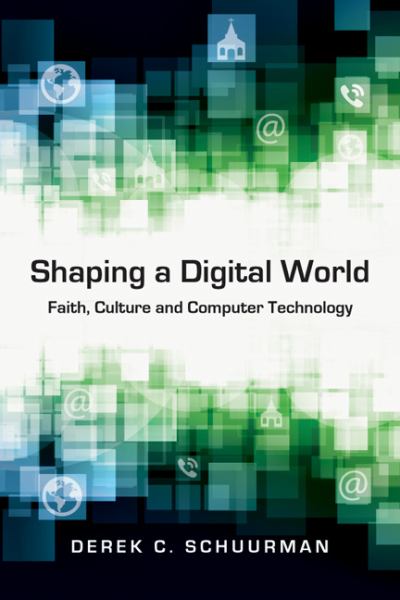 World: Faith, Culture and Computer Technology (IVP Academic; $18.00) by Derek Schuurman, a work that beautifully illustrates how an author can think distinctively as a Christian in both appreciating and critiquing the values, ethos, and practices embedded in a particular side of life or academic discipline. Such discernment can give us a truly insightful, faithful and fruitful way of bringing our faith to bear on the topic, and how we do or don’t relate to that particular sphere of life. In this case, the topic at hand is technology, and, particularly, computer science; I said that Schuurman’s new release is the best Christian book on the subject.
World: Faith, Culture and Computer Technology (IVP Academic; $18.00) by Derek Schuurman, a work that beautifully illustrates how an author can think distinctively as a Christian in both appreciating and critiquing the values, ethos, and practices embedded in a particular side of life or academic discipline. Such discernment can give us a truly insightful, faithful and fruitful way of bringing our faith to bear on the topic, and how we do or don’t relate to that particular sphere of life. In this case, the topic at hand is technology, and, particularly, computer science; I said that Schuurman’s new release is the best Christian book on the subject.
I went to great lengths — sorry! — to show that part of the genius of this book was how the author so clearly and pleasantly draws upon the tradition of those thinkers who call themselves neo-Calvinists. That is, they are re-appropriating for (so-called) “secular” subjects the Reformed theology of John Calvin, particularly standing on the shoulders of Dutch theologian, public intellectual and social activist, Abraham Kuyper. Dr. Kuyper, as you surely know if you’ve been reading these posts, started the first Protestant University that was not run by church or state (The Free University of Amsterdam, often now cited in its Dutch spelling, The Vrije and just shorted to the VU)) and at its inauguration, he insisted that we study, through the lens of the story of Scripture, “every square inch” of the world, since Christ is redeeming it all.
You may not know the first part of that famous quote where Christ says of every square inch “Min!” which reads like this: “Oh, no single piece of our mental world is to be hermetically sealed off from the rest…” Our discipleship is connected to everything, nothing is “seal off.” This is great news for those who want to, as Eric Liddell, the Scottish Olympic runner in Chariots of Fire put it, “feel God’s pleasure” when doing what he is doing.
Indeed, a recent re-issue of some of Kuyper’s early 20th century essays shows how God’s common grace helps us understand both the the arts and the sciences; it is called Wisdom &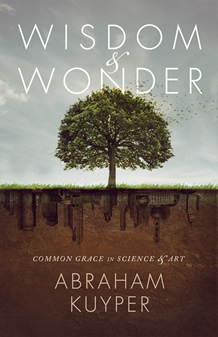 Wonder: Common Grace in Science and Art (Christian’s Library Press; $14.99) and we’ve offered it at 20% off that regular price at earlier BookNotes columns. It isn’t light reading although these were columns that had been published in the daily newspaper in those years.
Wonder: Common Grace in Science and Art (Christian’s Library Press; $14.99) and we’ve offered it at 20% off that regular price at earlier BookNotes columns. It isn’t light reading although these were columns that had been published in the daily newspaper in those years.
I guess this is true of most Christian faith traditions, but clearly more some than others. The Reformed tradition emphasizes learning. Using our minds. Reading books.
My United Methodist background, too, might have helped here — nobody told me growing up in my home EUB church, but I eventually learned that Wesley’s method was one of reading classic books in small groups. To redeem the time Wesley put book shelves in his carriage. (Do you use audio books on CD or on your smart phone, “reading” while you drive? You’re a good Methodist!)
It is good to again express my gratitude to those who helped me gain a passion for books, for Christian book-selling as we understand it, and for our hope that reading widely can help equip people to more meaningfully serve God in their daily lives, including their professional and public lives. To really understand Hearts & Minds, you have to appreciate something of the revolution it was to learn about the intregal relationship between the Bible and life, between thought and action, between faith and culture.
KUYPERIAN INFLUENCE IN THE RELIGIOUS LANDSCAPE
In that recent post about the new Schuurman IVP book on computer technology I argued, following historians George Marsden and Mark Noll, that Schuurman’s “creation regained” Christian worldview tradition, often called Kuyperian, has also influenced almost all of the very best recent Christian books on most academic disciplines — from art to science, business to education, engineering to pop culture studies, from gender studies to historiography, from linguistics to medicine.
Whatever the case, I do know that this neo-Calvinist tradition about uniquely Christian cultural engagement and the call to the vocation of Christian scholarship influenced Beth and I in significant ways back in the 1970s. She was raised Lutheran, I was raised United Methodist, we have Brethren relatives and I eventually worked for a Presbyterian (USA) church in those years, so this Dutch Reformed tradition talking about the Christian mind was new to us; for a handful of friends and co-workers, it was exciting and illuminating. Many of our heroes in that era were influence by Kuyper: from Francis and Edith Schaeffer to South African black liberation theologian Alan Boesak to contemplative writer Don Postema to Canadian friends at Toronto’s Institute for Christian Studies, We read philosopher Nicholas Woltersdorff, met Dutch Parliament member, economist Bob Goudzewaard, and read everything I could of publisher and Christian intellectual James Sire. We were meeting amazing folks, reading and learning a lot.
Eventually, we were hard at work promoting some of this wholisitc “transforming vision” perspective by bringing in friends like Al Wolters and Calvin Seerveld to the Pittsburgh Jubilee conference, which we helped organize through the campus ministry organization CCO that had some of these same influences. (If you are anywhere in the greater Mid-Atlantic, and near a college campus, your church should partner with the CCO to reach students via your congregation.) Perhaps it was there where we saw the fruits — with thousands of college students being equipped to be agents of God’s work in their respective college departments and eventual careers — of this neo-Calvinist vision, how to move from “worldview to way of life” as we used to say, and how “ideas grow legs.”
We saw authors and books being used to change people’s lives and we saw changed lives impacting relationships, neighborhoods, institutions. Some friends start inner city health clinics, creative alternative schools, high quality home painting businesses, an innovative, experimental Christian jazz band! People grappled with the ideas of Kuyper’s worldview, books were changing lives and vocations and callings were being evoked. Years later, when Beth and I got the gig of being Jubilee booksellers (a role we still enjoy each year) I would sometimes shout out the phrase “Read for the Kingdom!” Students got it.
God
‘s Kingdom comes through God’s own grace, but we have work to do. And to do it effectively we can’t just go touting at windmills — conservative evangelicals and liberal social activists all, too often, are big on passion and good intentions, but haven’t done the social analysis and foundational thinking about what really needs to be transformed if we are going to make lasting change. Books are tools. Forgive the militarist image, but Al Wolters used to talk about those doing intelligence behind the scenes in times of war. Somebody has to be doing the strategic-level, deep thinking, quiet, slow, behind the scenes. We have come to believe that bookstores are vital in equipping folks to that background work.
(An aside: sometimes I hear people askew my spiel about learning theology and Christina philosophy and thinking deeply about all areas of life. They think that all this worldview talk is irrelevant. Doesn’t matter much. Aha, I say: this just proves my point. Few people in the history of the Western world, at least, would say this, except for modern North Americans, who are taken with the home-grown philosphy of John Dewey, the philosophy of pragmatism. We are a get ‘er done society, and we want to roll up our sleeves and quite yappin’. But that is an idea — that we only learn what is right and true by action, not by theorizing — that is itself a theory that some philosopher invented, proclaimed, and which took hold and became popularized. If you mock the ivory tower and egg heads, well, I just want to say “gotcha.” That is an egg head philosophy that you’ve just adopted. Ideas and books and deep reflection really do matter and saying they don’t just illustrates the point.)
So, we were learning this worldviewish, culturally engaged, semi-scholarly stuff as a key not only to healthy and lasting social action, but as the content of the most faithful sort of wholistic evangelism. We invite folks to get in on this good stuff God is doing, recruiting folks to God’s agenda in the world. We we missional, before that phrase became au courant.
Yep, all this stuff really was the fertile ground from which our bookstore grew. That I worked for a bit at Pittsburgh’s Thomas Merton Center added some ecumenical flavor, and our involvement with radical protest movements (kudos to Phil Berrigan and his comrades in no-arms) kept us on our toes.
Our story is fairly colorful, our mentors diverse. It seems that our most notable influences, though, were located on the margins of the better-known Protestant traditions, the mainstream evangelical or the mainline denominations. We are evangelicals and we are committed to mainline churches, but neither faith tradition really have been captured by (and at times seem at odds with) the all-of-life redeemed influences we learned from neo-Calvinists in the line of Abraham Kuyper. Perhaps it makes sense that we learned much of this creation-regained world and life perspective from children of immigrants (mostly Dutch Canadians who immigrated with their Kuyperian dreams and vision after World War II.) Some of those immigrants are now elder professors at places like Dordt College and Calvin College, at Hope College, at ICS in Toronto, Redeemer College in Ancaster, Ontario, and Trinity Christian at Palos Heights, IL, to name a few. Some of their disciples took up positions at Geneva College in Western PA and other good colleges from Gordon to Montreat.
I say all of this yet again, because this is our story. It is a story that those who appreciate Hearts & Minds and want to support us should know. Maybe it helps you reflect on the strengths and weaknesses of your own religious influences and your faith journey.
The post before the last one, the one where I highlighted four new Kuyper books — offered a bit of our story and explained why we carry books (even whole categories of books) that aren’t found in most Christian bookstores. Mom and pop evangelical bookstores don’t carry much on media or science or urban studies or engineering or global justice issues; traditional Catholic shops don’t have much about relating faith and careers, either, except maybe devotional literature to practice God’s presence in the work-world or the (often helpful, if general) studies of Catholic social teaching applied to contemporary issues. Seminary bookstores have academic theology and some scholarly cultural theory, but, again, not ordinary books for the ordinary people of God to think faithfully, with discernment, about how to live as light and leaven in the workaday world. My sense is that most theological schools don’t care about those not in the guild, so many clergy are schooled in pastoral approaches that are a far cry from discipling the flocks into vocations of cultural engagement.
TWO EXAMPLES OF AREAS WHERE THIS MATTERS
To underscore the sad fruit of this, see How the Church Fails Businesspeople by John Knapp (Eerdmans; $15.00) which really helps expose (and offers helpful antidotes to) the churches weakness about serving those who work in corporate cultures. Or recall how pastor Tom Nelson found his church so very responsive when he (finally) started talking about these things — a story he tells quite well in Work Matters: Connecting Sunday Worship to Monday Work (Crossway; $15.99.)
As friends at The High Calling blogs are finding, there are thousands of ordinary Christian people who long to live out their faith in significant ways, but who must learn to do that in the realm of the office cubicle or shop floor or sales meeting or design studio. Take a look at — and sign up to stay in touch with — the fantastic website called (re)integrate for a great resources along these lines. If ordinary congregations don’t talk about this stuff much, para-church organizations will find folks pouring out their hearts, and regaining fresh energy for work-world mission. As long as churches presume some sacred vs secular dualism they will never really learn to equip ordinary people for ordinary life.
By the way, in an otherwise helpful book just recently published by a well-known press thoroughly committed to and situated among mainline denominations, authored by a Presbyterian minister, we read that work was created as cursed. Although this author eventually draws well upon Calvin, and Puritans like Baxter who passionately promoted solid thinking about vocations in the work-world, this exegetical nonsense slipped by editors there. Apparently this prominent scholar about the effects of work in our culture and pastor hadn’t read Kuyper (or any contemporary evangelical commentary on Genesis 1 or 2 for that matter) on the “cultural mandate” that insists that work is part of the “original blessing” that preceded the fall into sin. So it goes.
Or, consider how the documented research in David Kinnaman’s You Lost Me Why Young Christians Are Leaving the Church (Baker; $17.99) indicates that a sizable number of young churched kids leave church, and maybe even Christian faith, because they seemed to think that their congregations don’t care much about the arts, or about science, or about their passions and careers and work. I’ve long suggested that the symbolism (at least) of giving gifts to high school grads that intentionally help them relate faith and their calling as students (if they are going to college) is very, very important. But most churches — evangelical and mainline alike — usually fail at this, not making much of an effort to help students be Christian students, and our collegiates lose interest in church as soon as the autumn leaves begin to change on the college quad. Why pastors and church leaders don’t get this, I believ
e — and this is just one case study — may go back to the way in which seminary education is done, abstracted from the all-of-life redeemed vision of a robust Christian worldview, which, for whatever reason, they seem not to learn in their preparation for ministry. We have a churchy, constricted view of faith and call for precious little “cost of discipleship” when it comes to learning, reading, taking up one’s calling, or exploring vocations in the world with theological distinction.)
Anyway, Kinnaman’s book, and others like it, note that the in the very years in which students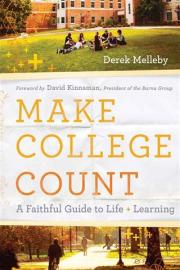 are making big, big choices — about identity, calling, vocation, truth, values, relationships and more — we often reduce faith to a less than robust, full-orbed worldview, It’s no wonder a lot of young adults don’t find it worth maintaining any serious connection to the church or faith of their youth. It will come as no surprise to you that we suggest Make College Count: A Faithful Guide for Life and Learning by our friend Derek Melleby (Baker; $12.99) as a key resource
are making big, big choices — about identity, calling, vocation, truth, values, relationships and more — we often reduce faith to a less than robust, full-orbed worldview, It’s no wonder a lot of young adults don’t find it worth maintaining any serious connection to the church or faith of their youth. It will come as no surprise to you that we suggest Make College Count: A Faithful Guide for Life and Learning by our friend Derek Melleby (Baker; $12.99) as a key resource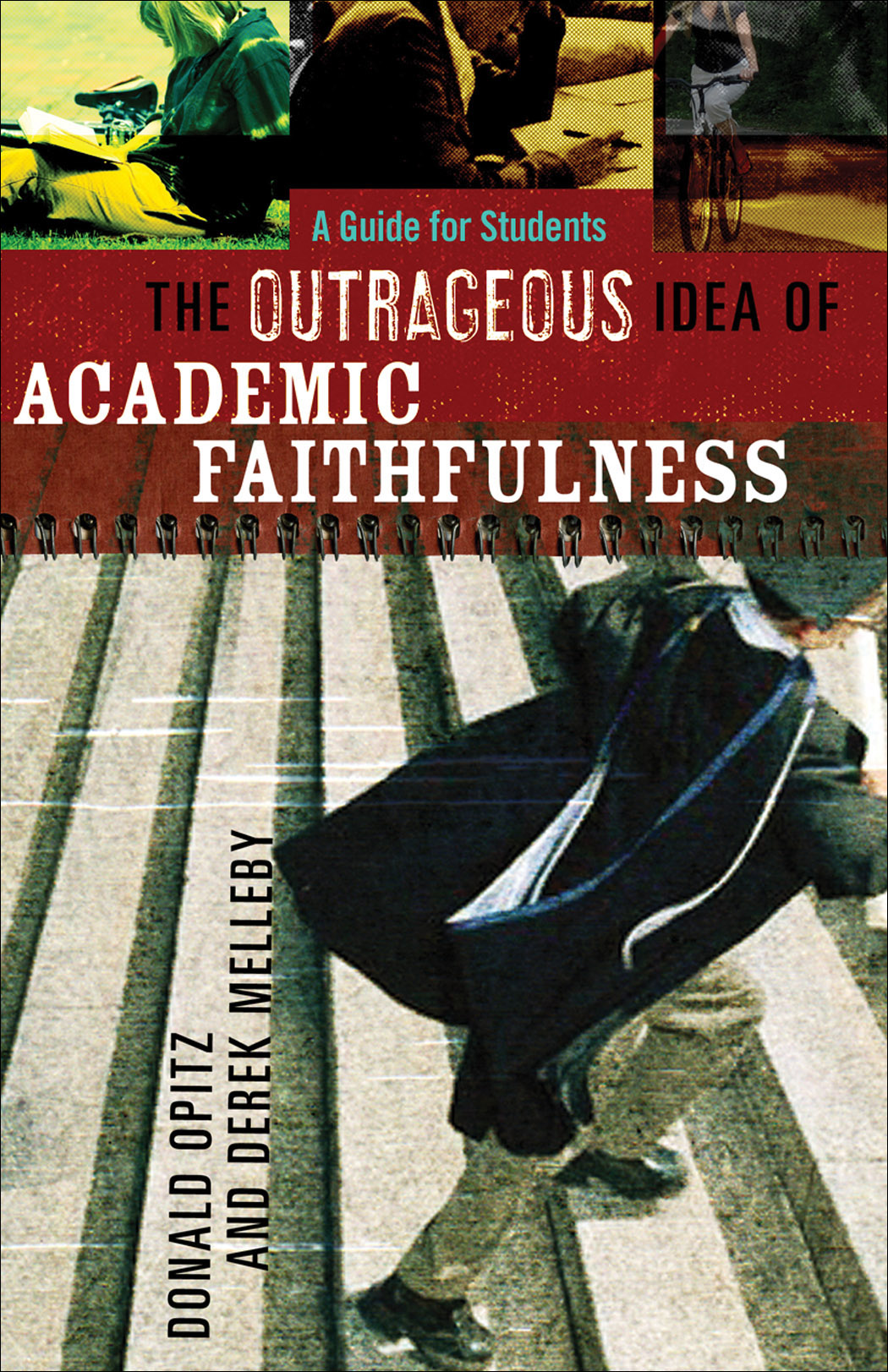 for those younger students heading off to college for the first time. Derek co-authored with Geneva College sociologist Donald Opitz a tremendously upbeat and fun and relevant study for older students, The Outrageous Idea of Academic Faithfulness: A Guide for Students (Brazos; $13.99) No other book for students gets at these things the way these do — is it any surprise they were influenced by this whole “all of life redeemed” integrated vision learned by Kuyper’s “every square inch” movement?
for those younger students heading off to college for the first time. Derek co-authored with Geneva College sociologist Donald Opitz a tremendously upbeat and fun and relevant study for older students, The Outrageous Idea of Academic Faithfulness: A Guide for Students (Brazos; $13.99) No other book for students gets at these things the way these do — is it any surprise they were influenced by this whole “all of life redeemed” integrated vision learned by Kuyper’s “every square inch” movement?
I’ve told you before that the part of our website (dreadfully in need of updating) called “books by vocation” is highlighted in a new booklet for college students, Your Mind’s Mission by Greg Jao (IVP; $4.00.) Again, there is nothing quite like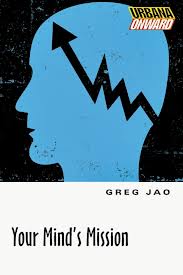 it, a powerhouse of a booklet, interesting, informative, inspiring, and also quite thoughtful, designed to help students take up the call to “think Christianly” and use their minds to advance God’s mission in the world. For the size and prize, it just can’t be beat. Jao draws on many of these same sources that we regularly highlight here. If you — or your children — are involved in a campus ministry fellowship group on campus and they don’t talk about these kinds of things, and aren’t familiar with these sorts of resources, I guess I wouldn’t shout “ministry malpractice” quite yet. But do know that you may need to share this stuff with them, helping them get this perspective onto their radar screen. Could you imagine a sports ministry that doesn’t relate faith and sports, or a fellowship group among artists, say, which doesn’t talk about art, or a missionary to, oh, say, Sweden, who doesn’t care about the things the Swiss do? But college ministries abound that fail to help students think Christianly about their calling and careers and their life in the classroom at college. Dumb. That’s just dumb. I hope you give your student’s going off to college some good resources to help them navigate the journey with this kind of relevance and integrity.
it, a powerhouse of a booklet, interesting, informative, inspiring, and also quite thoughtful, designed to help students take up the call to “think Christianly” and use their minds to advance God’s mission in the world. For the size and prize, it just can’t be beat. Jao draws on many of these same sources that we regularly highlight here. If you — or your children — are involved in a campus ministry fellowship group on campus and they don’t talk about these kinds of things, and aren’t familiar with these sorts of resources, I guess I wouldn’t shout “ministry malpractice” quite yet. But do know that you may need to share this stuff with them, helping them get this perspective onto their radar screen. Could you imagine a sports ministry that doesn’t relate faith and sports, or a fellowship group among artists, say, which doesn’t talk about art, or a missionary to, oh, say, Sweden, who doesn’t care about the things the Swiss do? But college ministries abound that fail to help students think Christianly about their calling and careers and their life in the classroom at college. Dumb. That’s just dumb. I hope you give your student’s going off to college some good resources to help them navigate the journey with this kind of relevance and integrity.
DEMAND FOR OUR KIND OF BOOKS? CHRISTIAN BOOKS ON ART, SCIENCE, BUSINESS, WORK, PLAY?
So, given this privatized and abstracted faith that is disconnected in fundamental ways to the spheres of career and public life and which therefore fails to call very strongly for integrated Christian perspectives in all areas of life, there isn’t as big of a demand for books about life and learning and work and social action as there ought to be. The feeble vision of what passes for ministry in many places not only steals God’s glory and fails God’s world, but, quite frankly, it hinders us from making a living doing what we do.
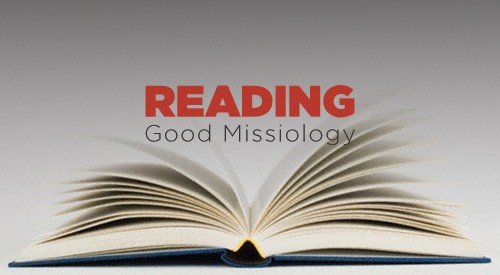 For those with a dualistic view, why would a health care provider want to read a theological book about the human body? Why would a local savings and loan officer want to read a book about faith and economics? Why would a family counselor what to read a book about different models of using the Bible in therapy? Why would an engineer want to read up on a faith-based evaluation of technology? Why would anybody want to hold up their entertainment practices (as sports fan or movie goer, say) to the demands of a Christian framework? Why indeed. That pastors and Bible teachers don’t often talk about these kinds of things (and most Christian authors of popular Christian books don’t much either) means that ordinary Christian folk just don’t think to be curious about these kinds of books, which they may not even know exist! Being a lawyer or doctor or school teacher having done some intentional thinking about what that means and looks like? How novel!
For those with a dualistic view, why would a health care provider want to read a theological book about the human body? Why would a local savings and loan officer want to read a book about faith and economics? Why would a family counselor what to read a book about different models of using the Bible in therapy? Why would an engineer want to read up on a faith-based evaluation of technology? Why would anybody want to hold up their entertainment practices (as sports fan or movie goer, say) to the demands of a Christian framework? Why indeed. That pastors and Bible teachers don’t often talk about these kinds of things (and most Christian authors of popular Christian books don’t much either) means that ordinary Christian folk just don’t think to be curious about these kinds of books, which they may not even know exist! Being a lawyer or doctor or school teacher having done some intentional thinking about what that means and looks like? How novel!
This is partially why we are nearly always broke, it seems, and why whole areas of our store — the shelves that hold oodles of books on creation care or aesthetics or business or engineering or teaching or medicine or law — are overlooked by folks in those very fields. Yet, we feel called to offer them, to hold up a vision of a Christian bookstore that is more than a typical bookstore, religious or otherwise.
Between the secularized and often weirdo stuff in mainstream bookstores and the narrow religious vision in most faith-based bookstores, there just isn’t much of a venue for quality books that are radically Christian but relevant and reasonable, equipping us to grapple with life, faith, vocation, culture, justice, art and the like. We aren’t the only place to buy books, we know, but we are trying to earn your support. We are trying to curate a selection of titles that our customers care about, that perhaps expands the definition of a “Christian bookstore.” We figure you know this — and we are so, so grateful for those of you who spread the news about us, who get your organizations buying books from us, who spread my reviews and send us orders — but we also wanted to ruminate a bit together about our roots, our background, our motivation, our story.
WHY?
?There are lots of reasons for the deficiencies of what most Christian bookstores promote, and reasons why most religious readers don’t even think to read a book about art or eating, commerce or shopping, technology or architecture. One of the obvious reasons some bookstore owners don’t promote this stuff is because, well, customers want stupid derivative tee shirts and simple inspirational fiction, and the demand, even for booksellers who may want to offer more mature and socially engaged books, just isn’t there.
I had mentioned “privatized” faith, though. Did you catch that? Surely part of the problem is the constricted vision – some call it a “sacred/secular dualism – that privatizes faith and fails to understand that all of our bodily life is worship (despite what Romans 12:1-2 proclaims so clearly!) We fail to live integrated lives where Sunday shapes Monday; where work is as holy as hymn-singing, where our politics and our prayers are seamless and related, where our shopping is
informed by our spirituality. We miss the truth, as Jim Wallis puts it, that Biblical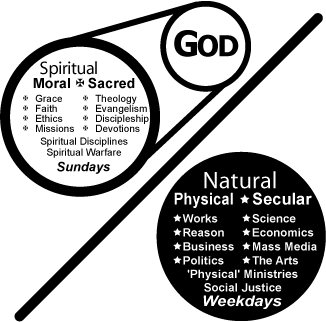 faith is “always personal but never private.” The dichotomy and dualism between the so-called sacred and so-called secular came from the pagan Greeks like Plato and isn’t a Biblically-faithful way of seeing life, where (as C.S. Lewis put it) “matter matters.” Authors as diverse as Brian Walsh and Richard Middleton (The Transforming Vision: Shaping a Christian Worldview [IVP; $17.99]) and Nancy Pearcey (Total Truth: Liberating Christianity from Its Cultural Captivity [Crossway; $20.99]) or Leslie Newbegin (The Gospel in a Pluralist Society [Eerdmans; $25.00]) all get at this. Dividing life into sacred and secular, and thinking of the human person as eternal souls trapped in temporal bodies, just isn’t how the Bible tells the story. We have got to stop talking like that.
faith is “always personal but never private.” The dichotomy and dualism between the so-called sacred and so-called secular came from the pagan Greeks like Plato and isn’t a Biblically-faithful way of seeing life, where (as C.S. Lewis put it) “matter matters.” Authors as diverse as Brian Walsh and Richard Middleton (The Transforming Vision: Shaping a Christian Worldview [IVP; $17.99]) and Nancy Pearcey (Total Truth: Liberating Christianity from Its Cultural Captivity [Crossway; $20.99]) or Leslie Newbegin (The Gospel in a Pluralist Society [Eerdmans; $25.00]) all get at this. Dividing life into sacred and secular, and thinking of the human person as eternal souls trapped in temporal bodies, just isn’t how the Bible tells the story. We have got to stop talking like that.
T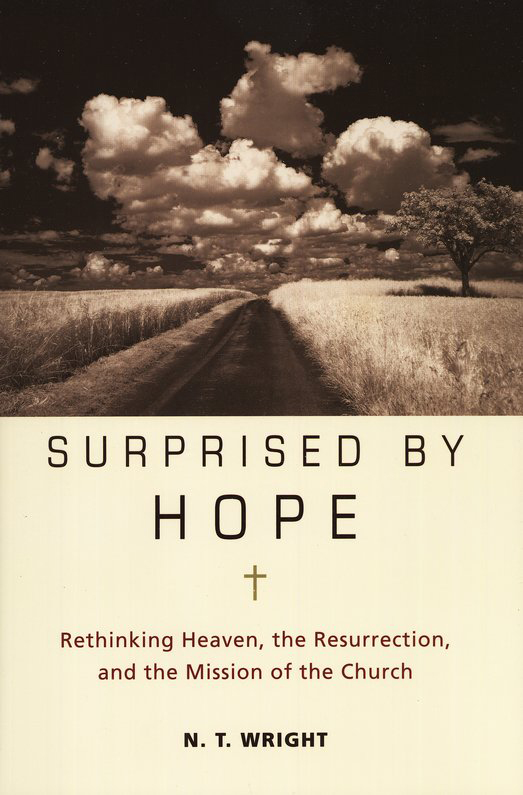 om Wright has helped us all a lot with this, in most of his books, but especially in his popular, thought-provoking Surprised By Hope: Rethinking Heaven, the Resurrection, and the Mission of the Church (HarperOne; $24.99.) It wonderfully explores how our views of the afterlife are not always properly informed by Biblical and theological clarity. And there’s that Greek dualism thing. What we think about the future does effect how we live now, so this call to rethink heaven clearly relates to the mission of the church.
om Wright has helped us all a lot with this, in most of his books, but especially in his popular, thought-provoking Surprised By Hope: Rethinking Heaven, the Resurrection, and the Mission of the Church (HarperOne; $24.99.) It wonderfully explores how our views of the afterlife are not always properly informed by Biblical and theological clarity. And there’s that Greek dualism thing. What we think about the future does effect how we live now, so this call to rethink heaven clearly relates to the mission of the church.
There is a fantastic video curriculum on it, too, also called “Surprised by Hope” (Zondervan; 6-part DVD and participants guide; $34.95.) I’ve lead discussions of it in my own church on two occasions, and we have been thrilled with the good conversations each time.
This great book and DVD teaches some sort of “realized eschatology” view that understands our final eternal destination not as an ethereal heaven but as a renewal of creation — a new Jerusalem! Jesus called it the Kingdom of God, and we pray for it to be manifest “on Earth as it is in Heaven.” (“As it was in the beginning, is now and ever shall be” we sing in the Gloria Patri, and I think that means that Christ has conquered the offensive principalities and powers, has through his cross and resurrection reversed the curse upon creation, and now reigns as the risen Lord of the world He made and loved, and we shall, someday, inhabit a restored Paradise. Of course it isnt’ quite right in the sense that the end plan is a city — there has been cultural development and a lot of history under the bridge of time.) This view of God’s agenda, the hope of heaven as “creation healed” helps us realize that there is no fundamental dualism between the spiritual and the material. In resurrection newness, we live ordinary life in this world, as the new creatures in Christ the Bible says we are, anticipating the glory that is to come.
That is why, by the way, that we are so keen to promote books on health and wholeness, on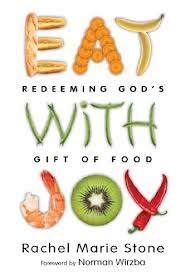 food and eating, and on seemingly mundane matters like homemaking, gardening, neighborhood life, caring for pets, even sports and leisure. The early church long ago named the super-spiritual, world-denying nature of gnosticism as a great heresy, and an inhuman threat, and we counter it by a vision which proclaims “whether you eat or drink” (or play or work) “do all to the glory of God.” (1 Corinthians 10:31.)
food and eating, and on seemingly mundane matters like homemaking, gardening, neighborhood life, caring for pets, even sports and leisure. The early church long ago named the super-spiritual, world-denying nature of gnosticism as a great heresy, and an inhuman threat, and we counter it by a vision which proclaims “whether you eat or drink” (or play or work) “do all to the glory of God.” (1 Corinthians 10:31.)
1 Timothy 4:1-4 even suggests it is the work of demons to suggest otherwise. Only occasionally do we trot that verse out when a customers implies we shouldn’t carry this book or that, shouldn’t stock that CD or DVD. But sometimes it needs to be said — dualism and gnosticism and privatized faith and sentimental anti-intellectualism have no place in the obedient Christian life.
I sometimes rather start, however, with Paul on Mars Hill (Acts 17) who clearly knew pagan Greek poetry and theater. He was conversant in the culture of which he was a part, apparently a devotee of reading widely. Heck, he was ordering books from young Timothy on his deathbed in that Roman prison (2 Timothy 4:13). Calvin’s commentary on that verse reminds us that we should, I can paraphrase, realize that no matter how spiritual we think we are, we should always be on the cutting edge of studying to learn new stuff. If the aging Apostle Paul himself, who was so inspired by the Holy Spirit that he was writing the Bible (!) had to keep reading and learning, ordering books, shouldn’t we?
NO-DUALISM TEE SHIRTS AND…
When I worked for the CCO in the 70s, we read books against dualism, but it was the training staff of the 90s that made “no dualism” tee shirts, showing the classic DaVinci human split asunder. How cool, and what an opportunity for conversation. Back in college we had a poster from the AACS (The Association for the Advancement of Christian Scholarship, which created the high level grad school, The Institute for Christian Studies) that had a big stack of then popular secular textbooks that said “we read a lot of these” underneath – “but never without this” besides it, emblazoned beneath a well-worn Bible. It was a cool poster, inviting a study of Noam Chomsky next to and in light of Scripture, reminding us of the calling of students to “take every thought captive” and think Christianly in the classroom. I guess that poster really sunk in, as it sums up our reason for being here at Hearts & Minds. (If anybody out there has one of those posters, it sure would be cool to have it scanned and on line. I’ve done Google image searches and can’t find it.)
Besides the “no dualism” tees and the “we read a lot of these, but never without this” poster, we had “life is religion” bumper-stickers.” We read a magazine called Vanguard that was about faithful cultural engagement in a way that nothing else in print that I knew of did. (Relevant of course didn’t exist yet, CT was very theological and churchy (as was Christian Century on the other end of the theological spectrum), Christianity and Crisis and Post-Amercan were progressive, mostly political and economic topics.) Does anybody recall the magazine out of Berklee called Radix? The was pretty great, too, offering Christ-centered, radical cultural analysis and a call to think about cultural renewal. This was the end of the Jesus movement, the waning days of the 60s counter culture, and an idealistic renewed understanding of faith’s powerful impulse to engage the culture that came from Kuyperian, reformational thought. Instead of simplistic, evangelical pieties (or the liberal whining against those who hold to those pieties so popular amongst progressives) we cut our teeth on worldview thinkers and cultural critics from Kuyper to Schaeffer to Dooyeweerd; from Bernie Zylstra and Henk Hark to Calvin Seerveld, Bob Goudzewaard, James Skillen, Nicholas Woltersdorff and Al Wolters to Mary Stewart Van Leeuwen, Richard Mouw, Sharon Gallagher, Roy Clouser, Brian Walsh and Richard Middleton. And, nowadays, Andy Crouch, James K.A. Smith and N.T. Wright who help us in these exact matters, just to name a few. These names may not mean much to you, but I have mentioned them all in other columns, and are thrilled to stock their books, books that I hope you know about.
As I said in
the last two posts, we learned of this feisty, relevant, culture-shaping vision from ministry leaders who had been shaped by the visionary legacy of Dutch theologian and public intellectual, Abraham Kuyper. (One of my own mentors in Dutch worldview thinking was Peter J. Steen, who died in the early ’80s.) That is why I made such a big deal (or tried to) sharing that post about four new books about Kuyper. These are an important part of our story here, and, if you are interested in what makes us tick, as they say, knowing these heady books and the movement they stand for would be helpful.
I know I said it before, but I again recommend Richard Mouw’s little paperback, Abraham Kuyper: A Short and Personal Introduction (Eerdmans; $16.00) wonderfully tells his own story of how he came to his place as a Kuyperian neo-Calvinist and it is a great place to start. I liked Mouw’s story, and I value his explanation of Kuyper’s most important ideas (even as he admits that not everything Kuyper did or said was right or good or helpful today.) He really does help us see why the Dutch statesman theories can help us reform the social architecture today.
The big, new James Bratt biography on Kuyper called Abraham Kuyper: Modern Calvinist, Christian Democrat (Eerdmans; $30.00) is itself an amazing history lesson, teaching about Kuyper, “warts and all” and is the definitive book if one wants an excellent study of his extraordinary life and its legacy. Perhaps a bit less daunting, for those unable to tackle the big Bratt, one might consider the Scottish book Abraham Kuyper: God’s Renaissance Man by James Edward McGoldrick (Evangelical Press; $18.99.)
If you still don’t believe me that this is good stuff, do check out this wonderful, wonderful article recently in Christianity Today. It is very nicely done by Pennsylvania friend, Geneva College history prof, Dr. Eric Miller: “How a Dutch Neo-Calvinist Helped Birth an Intellectual Movement.”
AN IMPORTANT CLARIFICATION ABOUT THE PHRASE NEO-CALVINIST
I know not all readers care about my Presbyterian and Reformed leanings, but this is important. If you talk at all about religious trends and demographics in recent years, you should be aware of this. Over the last few years, there have been more than a few blogs, a book or two, and even mainstream news stories about the renewal of old school Calvinism that has become popular these days. New publishing houses have been created, and new associations. Many in the evangelical world, including many Southern Baptists, are becoming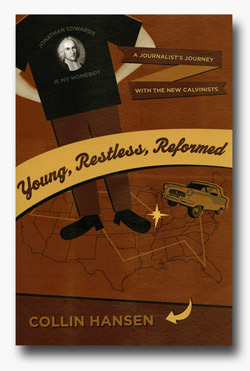 Calvinistic. One good book to get a feel for this is the important Young Restless and Reformed: A Journalist’s Journey with the New Calvinists by Collin Hansen (Crossway; $15.99.) The frustrating thing is that some casual pundits (and religious writers who ought to know better) have referred to this upswing in conservative Reformed doctrine as neo-Calvinism, which it is not. This recent religious phenomenon may be better described as a neo-Puritanism as much of the piety of young, restless newly reformed Calvinists is more Jonathan Edwards than Abraham Kuyper, more John Piper or Mark Driscoll than, oh, say, Jamie Smith or Richard Mouw. A new upswing in interest in conventional Calvinism does not equal neo-Calvinism.
Calvinistic. One good book to get a feel for this is the important Young Restless and Reformed: A Journalist’s Journey with the New Calvinists by Collin Hansen (Crossway; $15.99.) The frustrating thing is that some casual pundits (and religious writers who ought to know better) have referred to this upswing in conservative Reformed doctrine as neo-Calvinism, which it is not. This recent religious phenomenon may be better described as a neo-Puritanism as much of the piety of young, restless newly reformed Calvinists is more Jonathan Edwards than Abraham Kuyper, more John Piper or Mark Driscoll than, oh, say, Jamie Smith or Richard Mouw. A new upswing in interest in conventional Calvinism does not equal neo-Calvinism.
New interest in old Puritanism, with its attendant fixation on fine-tuned descriptions of atonement theory, say, and the claim that Christ is sufficient for everything, is, again, not the same thing as what has long been called neo-Calvinism. This is a large distinction, and one that sloppy commentators have muddled, starting with the wildly popular “10 Ideas Changing the World Right Now” cover story in Time magazine a few years ago. (I saw that article cited somewhere just this week!) The phrase neo-Calvinism has a long, storied, linage (as that Jim Bratt biography just begins to tell) and the fairly recent “Gospel Coalition” and the hip, young, conservative “newly” Reformed movement may or may not find themselves in alignment with the trajectory of full-orbed, democratic, Dutch Kuyperianism. In other words, some who have recently embraced strict Reformed doctrine may not want to live into a reformational vision of the sort I’ve described here.
atonement theory, say, and the claim that Christ is sufficient for everything, is, again, not the same thing as what has long been called neo-Calvinism. This is a large distinction, and one that sloppy commentators have muddled, starting with the wildly popular “10 Ideas Changing the World Right Now” cover story in Time magazine a few years ago. (I saw that article cited somewhere just this week!) The phrase neo-Calvinism has a long, storied, linage (as that Jim Bratt biography just begins to tell) and the fairly recent “Gospel Coalition” and the hip, young, conservative “newly” Reformed movement may or may not find themselves in alignment with the trajectory of full-orbed, democratic, Dutch Kuyperianism. In other words, some who have recently embraced strict Reformed doctrine may not want to live into a reformational vision of the sort I’ve described here.
For an energetic and feisty delineation between the two movements (those newly interested in Old Calvinism and the neo-Calvinism of Kuyper) I highly recommend the creative pieces by my friend Bob Robinson. He draws on names, conferences, schools, and journals that you should know if you want to be informed about the religious landscape of North American evangelicalism.
First, read this. At then end, he has five links, each an article comparing and constrasting the two schools or movements. He looks at a representative historic figure, two magazines, two popular preachers, two conferences, two institutions of higher learning, and two different emerging leaders. Wow.
http://vanguardchurch.blogspot.com/2009/04/which-is-new-calvinism-neo-puritanism.html
For a more sober and perhaps generous evaluation of these two camps, we recommend this thoughtful piece by Ray Pennings from the Kuyperian Comment magazine.
Here is a list of the “Contours of a Missional Neo-Calvinism” by Mike Goheen and Craig Bartholomew as reported by our friend Steve Bishop in the UK. Good stuff, quick!
And in a great piece, the very influential, and gracious thinker Al Wolters, offers his suggestions about the neo-Calvinist agenda, and “what is to be done” that was part of an intriguing symposium at the neo-Cal Comment magazine.
And, while you’re at, enjoy the wonderful piece by Clay Cooke, a US evangelical who discovered the robust creational theology of neo-Calvinism, and wondered how to incorporate this culturally relevant vision with his desire for a deep devotional piety. Very nice. “Evangelicalism and Neocalvinism: Friends or Enemies?”
“Evangelicalism and Neocalvinism: Friends or Enemies?”
Cooke is right about this. Despite his towering intellect and tireless public activism and finally becoming the Prime Minister and major European statesman, Kuyper was most beloved and well known amongst the common people of his land for his daily devotional writing, such as the lovely book Near Unto God, a set of reflections on the Psalms. Get the edition adapted by James Schaap (Dordt College Press; $17.99) which Eugene Peterson called “an enduringly nurturing guide.”
BOTH/AND
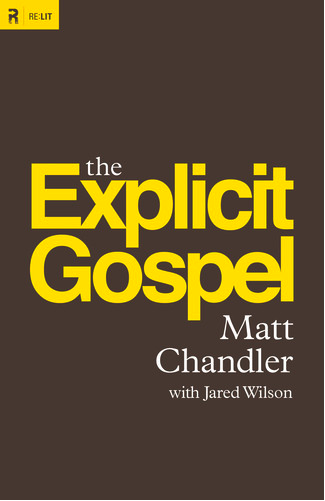 The Explicit Gospel by Matt Chandler with Jared Wilson (Crossway; $17.99) I am not sure this book emerged from this battle of terms, and the important nuances that distinguish these two camps but it is concerned about these two ways of living into a Biblically Reformed theological vision these days. I think it is very helpful. Chandler, who has not had affiliations with the reformational movement but is aligned more with the neo-Puritans, shows the strengths and weakness of those who have a gospel-centered vision that emphasizes the assurance of salvation, understanding the atonement, makes clear about how justification works, that helps us resist personal idols and the simple truths of grace “on the ground.” This group is quick to talk about “treasuring” the gospel (ht to John Piper) and (in contrast) those who fixate on the cultural mandate, Kingdom thinking, social renewal, and the big picture of the restoration of all creation, including the social architecture and institutions of the society. One tends to have an approach that forms people through the lens of systematic theology while the other tends to shape people by the unfolding story of Scripture — creation/fall/redemption/restoration and the like. In some ways, this is naming the approaches of the newly Calvinistas and the Kuyperian neo-Calvinists.
The Explicit Gospel by Matt Chandler with Jared Wilson (Crossway; $17.99) I am not sure this book emerged from this battle of terms, and the important nuances that distinguish these two camps but it is concerned about these two ways of living into a Biblically Reformed theological vision these days. I think it is very helpful. Chandler, who has not had affiliations with the reformational movement but is aligned more with the neo-Puritans, shows the strengths and weakness of those who have a gospel-centered vision that emphasizes the assurance of salvation, understanding the atonement, makes clear about how justification works, that helps us resist personal idols and the simple truths of grace “on the ground.” This group is quick to talk about “treasuring” the gospel (ht to John Piper) and (in contrast) those who fixate on the cultural mandate, Kingdom thinking, social renewal, and the big picture of the restoration of all creation, including the social architecture and institutions of the society. One tends to have an approach that forms people through the lens of systematic theology while the other tends to shape people by the unfolding story of Scripture — creation/fall/redemption/restoration and the like. In some ways, this is naming the approaches of the newly Calvinistas and the Kuyperian neo-Calvinists.
This is not the same debate, by the way, as the earlier one between a merely personal gospel and the social gospel, between evangelicals and social activists, although it is similar, perhaps somewhat parallel.
(The definitive book that lays that old stupid split to rest is Ronald J. Sider’s must-read Good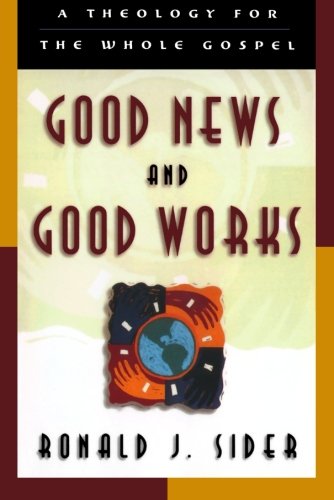 News and Good Works: A Theology of the Whole Gospel [Baker; $20.00.] Evangelical Anabaptist that he is, he gets it so, so right, with a passionate care for peace, social reform and public justice and a very sincere heart for Christ-centered evangelism and traditional proclamation of the gospel. With insights from Kuyperians, though, Ron insists that the both/and wholistic view of salvation that he proposes — words and deeds — points to a whole “creation regained” vision, which goes under the Biblical rubric of The Kingdom of God. Right on, Ron, right on!)
News and Good Works: A Theology of the Whole Gospel [Baker; $20.00.] Evangelical Anabaptist that he is, he gets it so, so right, with a passionate care for peace, social reform and public justice and a very sincere heart for Christ-centered evangelism and traditional proclamation of the gospel. With insights from Kuyperians, though, Ron insists that the both/and wholistic view of salvation that he proposes — words and deeds — points to a whole “creation regained” vision, which goes under the Biblical rubric of The Kingdom of God. Right on, Ron, right on!)
Matt Chandler, in The Explicit Gospel, his Crossway book about the two different styles of being gospel-centered and Reformed these days is wise, I think, in many ways, and I think his study helps all of us — Reformed or not, Kuyperian or not — to consider deeply the basics of the faith and to learn to communicate them well. Of course, the question he is exploring is: “what is the gospel?” (Is it that your individual soul is saved by accepting Christ’s substitutionary death or is in the inauguration of the Kingdom of God which is a healing of the cosmos? Or both?) That Chandler ends up more or less “both/and” is a healthy, rather Kuyperian move, by the way, and the indication that a book like this even points to this bigger context of personal salvation is, if I may be so bold, proof of my thesis that this Kuyperian worldview/ Kingdom vision stuff is rubbing off. I don’t think a book quite like this would have been written even ten years ago.
I am glad for the young Puritans and their hip blogs and books such as the popular Matt Chandler, David Platt, Frances Chan, Tim Challies, Justin Taylor, Kevin DeYoung, and any number of young, restless, Reformed men (and most of the authors are men.) I don’t agree with all that they write, but they are part of a renewal that is sweeping the land, and it is bearing fruit in people reading old books, digging deeper into the first things of the gospel, and has energized a new passion for church planting, missional outreach, and the development of an often healthy on-line presence.
THE IMPLICATIONS OF KUYPER’S 1898 “LECTURES ON CALVINISM”
Still, it has been Kuyperians who, starting in the late 1800s and early 20th century, construed a socially-oriented neo-Calvinism, a movement that, among other things, emphasizes common grace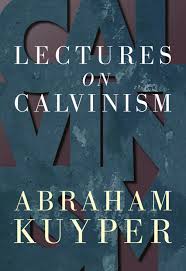 (for the common good) in a pluralistic society and yet asserts the need for a distinctively Christian mindset and approach to all areas of life, including the spheres of business, education, science, the arts, and politics. Kuyper outlined this robust, multi-faceted, culturally-influential, wide-as-life vision of transforming culture in his 1898 Stone Lectures at Princeton, still in print as Lectures on Calvinism (Eerdmans; $16.00).
(for the common good) in a pluralistic society and yet asserts the need for a distinctively Christian mindset and approach to all areas of life, including the spheres of business, education, science, the arts, and politics. Kuyper outlined this robust, multi-faceted, culturally-influential, wide-as-life vision of transforming culture in his 1898 Stone Lectures at Princeton, still in print as Lectures on Calvinism (Eerdmans; $16.00).
My take on that dense, historic work is simply this: Calvinism is too often considered to be about predestination and obsessed with theological arcana, mostly around issues of the atonement and God’s character. (Young, restless new Calvinists seem more than willing to fight over these doctrinal matters, it seems, often acting rather ungracious about grace, reinforcing a negative stereotype about those who are passionate about this rather limited view of Calvinism and Reformed theology and the squabbles it too often generates. It is why I so recommended the James Smith book of pastoral letters to tone this down a bit — see below!) Kuyper, however, while still firmly committed to most teachings of the great Genevan reformer (and more than willing to fight about them, too) wondered what it would look like to press the sovereignty of God not only into matters of election, but into matters of culture, society, and the spheres of the nation. That is, he is interested in God’s reign over history – surely a theme going back at least to Augustine. So it should come as no surprise that neo-Calvinism or Kuyperianism has born fruit of cultural organizations and distinctive scholarship (hence, that great Kuyper Center book on the arts and music that I highlighted, and the new book on computer science by Schuurman! Did you know that Kuyperians formed an alternative Christian labor union in Canada, the CLAC, the does collective bargaining from a view of reconciliation, with an emphasis on the dignity of the worker in partnership with management? They are too socially engaged for most safe Christian folk who can’t imagine developing a uniquely Christian theory of economics and unions but they aren’t as socialistic and adversarial as most traditional secular unions. So they are ignored by the church and often hated in the streets. Ahh, this is radical, good stuff, the stuff that — as far as I can gather — only Kuyperians have come up with. Some serious Catholics and many Mennonites have joined their ranks, since they, too, have a faith that expresses itself in comprehensive social theories that are at odds with the militant and materialistic philosophies of most unions.)
At the very least, those inspired by this vision end up talking about vocation and calling and cultural engagement, not merely doctrine and theology. One of the differences between neo-Calvinism and more traditional, conservative Calvinism that Bob Robertson observed in the link I offered above, is the difference between, say, the reformational Jubilee conference (or maybe even the somewhat similar Q events) which emphasizes thinking and living faithfully in various career tracks and the more doctrinally-focused events popular among the stricter Reformed folks who have conferences themed around systematic theological topics. Of course, Jubilee wants to have proper doctrine, and I supp
ose the Gospel Coalition leaders want their grace-filled, gospel-centered disciples to go out into work and society as agents of some sort of social advancement, but there it is, the two different emphases and trajectories. Older school conservative Calvinists too often fixate on theology and doctrine and church polity while Kuyperian neo-Calvinists have for a century promoted the reformation of all of life, based on distinctively Christian thinking and scholarship to provide guidance in different social spheres.
So, anyway, to recap: when we talk about neo-Calvinism, this is an allusion to the reformational worldview of the Dutch statesman Abraham Kuyper, whose “wide as life” understanding of redemption emphasized cultural engagement and Christian thinking and has generated a variety of uniquely Christian organizations and ministries that are committed to institutional transformation.. His was an orthodox and evangelically Reformed sort of social gospel, in distinction to the narrow pietism of the conservatives (not to mention the liberal heterodoxy of most mainline expressions of faith.)
Therefore, when I say (as I often do) that we here are neither left nor right, it often means that we think that Biblical people shouldn’t tie their hopes to the societal theories or social agendas of liberal or conservative political thinkers. But, more foundationally, it means that, as some sort of Kuyperian, I need to humbly suggest that old school evangelical truisms and old school liberal theologies are both wanting. It might be said that one constricts the scope of the gospel while the other confuses the content of the gospel. As one with a foot in both well-known camps – evangelicalism and mainline denominationalism – it is good to know that there is a better place to stand, and that is upon the ground tilled well by Kuyper and his neo-Calvinist movement.
We need orthodox foundations and an opened-up, forward-thinking cultural vision that is consistent with a solid, faithful regard for the authority of Scripture. As Chandler’s book reminds us, we need to be explicit about the gospel, but we must, as Kuyper so consistently reminds us, know that the gospel is the inauguration of the Kingdom, which means that all of life is being redeemed, as Christ’s claim over His world comes, “on Earth as it is in heaven.”
An important, popular writer today who took in this “reformational movement” and studied with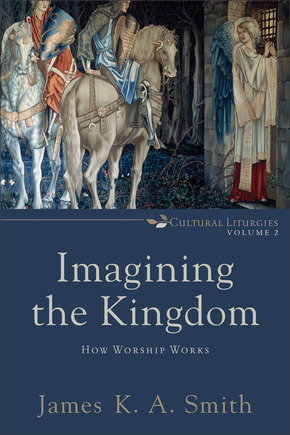
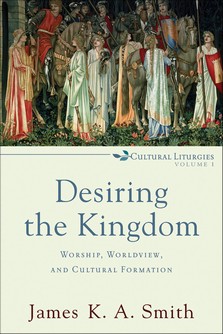 neo-Calvinists at Toronto’s ICS is James K.A. Smith, whose recent books are, by all accounts, must- reads. Few books have been as discussed and embraced in recent years as Desiring the Kingdom: Worship, Worldview, and Cultural Formation and Imagining the Kingdom: How Worship Works. Jamie is a friend, and so we are eager to promote his stuff, but, truly, these are among our favorite recent books and although they are serious and provocative, you really, really should know them. Both of these in his “cultural liturgies” series are published by Baker Academic and sell for $22.00 (although we have promoted them often at BookNotes and still offer them for 20% off!)
neo-Calvinists at Toronto’s ICS is James K.A. Smith, whose recent books are, by all accounts, must- reads. Few books have been as discussed and embraced in recent years as Desiring the Kingdom: Worship, Worldview, and Cultural Formation and Imagining the Kingdom: How Worship Works. Jamie is a friend, and so we are eager to promote his stuff, but, truly, these are among our favorite recent books and although they are serious and provocative, you really, really should know them. Both of these in his “cultural liturgies” series are published by Baker Academic and sell for $22.00 (although we have promoted them often at BookNotes and still offer them for 20% off!)
PIPER, KUYPER, AND THE BROADER REFORMED TRADITION
To get a taste of Smith’s pastoral heart, and how he guides readers from older school, strict Calvinism to a more Kuyperian, broader Reformed tradition, I highly recommend his quite l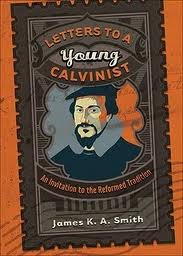 lovely and very kind Letters to a Young Calvinist: An Invitation to the Reformed Tradition (Baker; $14.99.) I was not kidding when I said – and I said it often, when this little book came out a few years ago — that Letters to... is very helpful, even if you are neither young nor Calvinist.
lovely and very kind Letters to a Young Calvinist: An Invitation to the Reformed Tradition (Baker; $14.99.) I was not kidding when I said – and I said it often, when this little book came out a few years ago — that Letters to... is very helpful, even if you are neither young nor Calvinist.
This great little book ruminates on some of the broad themes of the Presbyterian and Reformed tradition and is both ecumenical in spirit and neo-Calvinist in orientation; as I sometimes put it, this book draws on authors from Piper to Kuyper, with an appreciation for both, but with an emphasis on the latter. And, it reminds us all to be generous in our understandings of orthodoxy and broadly engaged in missional projects of social renewal as we live out our faith in the contemporary culture. I really love that little book and can hardly think of a better, tender guide into these big conversations!
By the way, I have had more than one mainline pastor ask me about Mark Driscoll or John Piper or other conservative evangelicals of this sort, wondering about their appeal, and if they should be distressed that students from their parishes have gone off to college and come hope talking like they just invented the Protestant Reformation. I do think this book is helpful to understand some of this, and would be good to give to any young person newly excited about Reformed faith, but with a rather narrow view of it all.
And I like that Jamie points us back to Kuyper.
Anyway, these are some of our cards, out on the table. Add in some mystical spirituality and some social justice activism and some Anabaptist pacifism — not to mention mainline denominational stuff from all over the map and books with no Christian content whatsoever — and you’ll get a bit of the curious mix of titles you can find at Hearts & Minds. (You know that our full inventory is not on line – sorry! We have thousands and thousands of titles, with new stuff arriving daily!) The philosophy of our store — not exactly a typical “Christian” bookstore, but not just a general market bookstore, either — comes from these themes and instincts based on the teachings of Kuyper. In common grace, we realize God can speak widely through all manner of art, literature, poetry, science. We fear no zone of life, and carry all kinds of interesting books, to be read (always) with discernment. But, in radical discipleship, we are called to be holy, living well before God, thinking faithfully in and about all areas of life. We are to be leaven and light, “in but not of” the world, and books (and the conversations that emerge from them) are chief tools of formation and discipleship as we are equipped to be God’s salt and light in the world in which we live.
READING WIDELY AND WILDLY
We believe in reading widely, so we can be wildly ecumenical. One of the reasons we enjoy (and believe it wise and important, as well) to read widely is because of this Kuyperian instinct that God is at work in the world, and that in God’s sovereign common grace has allowed good insight about things to pop up all over. I don’t know enough about Kuyper’s own sensibilities about this, but I like to think that his convictions about God’s rule over all of life authorizes pleasant habits of reading all sorts of things.
HOLY AND RELEVANT? IN BUT NOT OF?
At risk of belaboring the point (a point I may have belabored quite enough already) or of oversimplifying, allow me to ponder this just a bit more and it has been a huge hurdle for many to overcome. Even those who don’t necessarily fret about reading widely might ponder how to talk about it, since so many do have anxieties about what is acceptable reading and viewing.
It seems to me that more conservative Christians are, in principle at least, opposed to reading widely. They turn up their noses when they see the mainstream a
uthors in our store, and we sometimes apologize for stocking non-Christian thinkers or novelists. I understand that desire for holiness, and am embarrassed by some of the language in some of the novels these days. (And yet, how does one write a novel like the Pulitzer Prize winning Middlesex without some graphic language?)
These sort of folks may imbibe without much critical distant right-wing radio talk show guys who aren’t particularly evangelical, but, mostly, they keep their distance from mainstream CDs or novels; inconsistent with what they allow into their lives, it seems tome, but that’s how they roll. I think they are admirable in wanting to be discerning and careful and holy about culture. They are weak on relevance and miss much of what the Bible itself tells us about cultural engagement, the use of our minds, and how to be engaged with the world around us.
On the other hand, there are those who turn up their nose at those who turn up their noses at the sin of our society. The more liberal tradition sucks in Oprah and Dr. Oz and Jay Leno and, if sophisticated, the New York Times The Atlantic Monthly and The Huffington Post. There is – I am sure you know this by now – nothing wrong with this, except that they too often fail to display faith-based thinking, they are not Biblically-informed in their evaluation or discernment. They read widely, but often don’t make intentional efforts to “think Christianly” about the wide reading they do. That is, they are strong on relevance and engagement, but weak on distinctive holiness.
Both of these approaches presume a dualism, each drawn to either the sacred or the secular. One tries to be discerningly holy but is not very engaged, one is engaged but not very discerningly holy.
I have said before that the “in the world but not of it” worldview that Kuyper’s tradition taught us demands both. Kuyper’s own age was replete with church struggles on this very topic, with folks coming down heavily on either “common grace” or “the antithesis.” Kuyper himself may have emphasized one at one point or another.
Of course, we must be relevant and holy; holy and relevant. After all, true holiness in the Bible is supremely relevant (ahh, just read the prophets who rail against super-spiritual piety that fails to engage the need for justice as one example of how holiness devoid of justice is pseudo-holiness, false piety.) True relevance, as many good authors have taught us – think of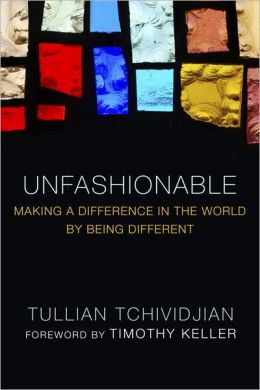 Tullian Tchividjan’s Unfashionable: Making a Difference in the World by Being Different (Multnomah; $14.99) – must be shaped by faith and have something transcendent to offer. What good is it to bend over backwards to engage the world, only to have nothing unique to share once we “build the bridge” and relate relevantly to the culture around us? So this is a call to more than balance, but to a robust sort of “in but not of” holy relevance, a relevant sort of holiness. Richard Mouw shaped me years ago in a wonderful, now out of print book, then published by Augsburg Fortress, entitled “Called to Holy Worldliness.” That’s it!
Tullian Tchividjan’s Unfashionable: Making a Difference in the World by Being Different (Multnomah; $14.99) – must be shaped by faith and have something transcendent to offer. What good is it to bend over backwards to engage the world, only to have nothing unique to share once we “build the bridge” and relate relevantly to the culture around us? So this is a call to more than balance, but to a robust sort of “in but not of” holy relevance, a relevant sort of holiness. Richard Mouw shaped me years ago in a wonderful, now out of print book, then published by Augsburg Fortress, entitled “Called to Holy Worldliness.” That’s it!
(This would be another huge digression, and I hope to write about this another time, but you should realize, I guess, this this quick model of two extremes that are both inadequate — world-denying evangelicals and culturally-captured mainline liberals — draws on what might be considered caricatures, gleaned from the influential book Christ and Culture by H. Richard Niebuhr (Torchbooks; $15.99), who favored the “Christ transforming culture” model of the Reformed. Like many caricatures, though, it is based on much truth, truth that I see every single day in publishing — wacky evangelical stuff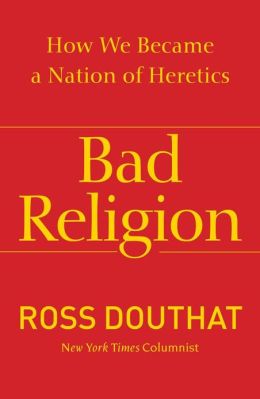 that implies we dare not engage this real world without being terminally stained, or wacky liberal stuff from Westminster/John Knox, Fortress, or HarperOne, that denies core Christian teaching. I think that the recent award winning book — even commended by The Christian Century — Bad Religion: How We Became a Nation of Heretics by Russ Douthat (Free Press; $16.00 ) is important here. In many ways, North American religion has adopted too unknowingly the ways of the surrounding culture, and it has effected us profoundly.
that implies we dare not engage this real world without being terminally stained, or wacky liberal stuff from Westminster/John Knox, Fortress, or HarperOne, that denies core Christian teaching. I think that the recent award winning book — even commended by The Christian Century — Bad Religion: How We Became a Nation of Heretics by Russ Douthat (Free Press; $16.00 ) is important here. In many ways, North American religion has adopted too unknowingly the ways of the surrounding culture, and it has effected us profoundly.
But here is my relevant aside: there is a strange reversal afoot. Some mainline seminaries and publishers are much more orthodox than they used to be on things that matter most. And some evangelicals are hardly recognizable as such.
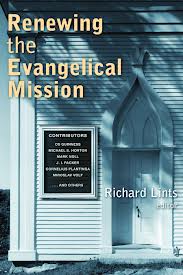 The best book on this latter part of the problem — the selling out of contemporary evangelicals — is seen in an amazing, powerful collection of pieces inspired by the work of David C. Wells, called Renewing the Evangelical Mission, edited by Richard Lints (Eerdmans; $34.00.) It has important pieces packed full of sociological criticism, theological pondering, church-related discernment, all wondering, in the legacy of the major work on this done by Wells, how to call those who claim to care most about the heart of the gospel, back to the heart of the gospel. If read many of these essays, from Os Guinness, Miroslov Volf, J. I. Packer, Michael Horton, Kevin Vanhoozer, Cornelius Plantinga and more. ??It was bad enough when evangelicals could be categorized as disengaged but purist, culturally irrelevant, but clear about first things. Alas, it seems they are increasingly like their older nemesis, mainline Protestants who were known for being high on relevance but not so good on orthodox holiness. Many Catholics, Lutherans and Anglicans now seem best situated to stand for historic truths in relevant ways. Anyway, Renewing the Evangelical Mission is an important volume for many of us, a good followup to Wells’ many heart-felt, scholarly assessments of the state of faithfulness in our time.)
The best book on this latter part of the problem — the selling out of contemporary evangelicals — is seen in an amazing, powerful collection of pieces inspired by the work of David C. Wells, called Renewing the Evangelical Mission, edited by Richard Lints (Eerdmans; $34.00.) It has important pieces packed full of sociological criticism, theological pondering, church-related discernment, all wondering, in the legacy of the major work on this done by Wells, how to call those who claim to care most about the heart of the gospel, back to the heart of the gospel. If read many of these essays, from Os Guinness, Miroslov Volf, J. I. Packer, Michael Horton, Kevin Vanhoozer, Cornelius Plantinga and more. ??It was bad enough when evangelicals could be categorized as disengaged but purist, culturally irrelevant, but clear about first things. Alas, it seems they are increasingly like their older nemesis, mainline Protestants who were known for being high on relevance but not so good on orthodox holiness. Many Catholics, Lutherans and Anglicans now seem best situated to stand for historic truths in relevant ways. Anyway, Renewing the Evangelical Mission is an important volume for many of us, a good followup to Wells’ many heart-felt, scholarly assessments of the state of faithfulness in our time.)
So, to recap this particular point: nearly all sectors of the Christian church in the West is confused and imbalanced regarding their stance to culture and the in/not of approach that demands holy relevance.
Kuyper taught us – to be holy in a truly Biblical way is to be engaged in the world; to be properly engaged in the world demands Biblical holiness.
Which authorizes us to read widely, but with discernment. We learn the art of discernment, but not as a mystical spiritual practice to determine God’s secret voice or as a punctilious legalistic practice to see what we are allowed to do in the world,. The art of prophetic spiritual imaginative discernment involved reading the signs of the times, understanding our place in history, caring about the issues of the day, in every zone of life, and being transformed in ways that help us embody wisely the coming reign of God, truly in but not really of the society around us. We believe books can help us come up with counter-cultural practices for the common good. We read widely, thinking and talking and enjoying the written words of fiction and nonfiction, always through Bible-shaped lenses, in community with others, who, as comrades in the struggle, want to honor God by being Christ’s agents in and for the world. We read with holy relevance, we become relevant and holy to serve God’s purposes in the world.
WHO HELPS US LEARN TO READ FOR T
HE KINGDOM?
My fear is that many churches are not adequately helping people do this, thinking about cultural holiness, relating faith to vocation, or nurturing Christian reading habits to do all this.
Some pastors recommend books, some parishes have strong church libraries, some congregations seem to have an ethos of being life-long learners, bookish folks with reading groups and discerning conversations about big ideas. A few encourage lay people to serve God in their work-a-day worlds and encourage reading about Christian perspectives in their careers and callings. I hear about such churches so I know they exist. But I don’t think there are many.
Most Christian traditions do affirm thinking faithfully about all of life, and many, in theory, at least, affirm reading widely in order to be equipped to serve distinctively in vocations in the world.
Two of the all-time most elegant passages about all of this come from the lovely, lovely first book of Barbara Brown Taylor, her autobiographical The Preaching Life (Cowley; $17.95.) I read these passages out loud sometimes, and folks are always moved. She has a wonderful story of a pastor who mentioned her love for tadpoles in his sermon — and helped her see “God’s glossolalia” in the intricacies of nature, and God’s Spirit at work in her own desire to learn, and to care for creation; this literally help move her to faith, realizing she was in this God-drenched world, and it is a beautiful part of her story. The second section is about the vocation of lay people, and how their callings, like hers as an Episcopal priest, are sacramental in nature. She lists off a handful of jobs and in a phrase notes how they might fulfill some profound human role. It’s beautiful stuff. I only wish more churches believed this, or talked about it some.
book of Barbara Brown Taylor, her autobiographical The Preaching Life (Cowley; $17.95.) I read these passages out loud sometimes, and folks are always moved. She has a wonderful story of a pastor who mentioned her love for tadpoles in his sermon — and helped her see “God’s glossolalia” in the intricacies of nature, and God’s Spirit at work in her own desire to learn, and to care for creation; this literally help move her to faith, realizing she was in this God-drenched world, and it is a beautiful part of her story. The second section is about the vocation of lay people, and how their callings, like hers as an Episcopal priest, are sacramental in nature. She lists off a handful of jobs and in a phrase notes how they might fulfill some profound human role. It’s beautiful stuff. I only wish more churches believed this, or talked about it some.
Perhaps I was too harsh in saying evangelicals and liberals alike fail to equip the laity for “holy worldliness” and thinking intentionally about faith-shaped approaches to their vocations. Maybe more do than I admit. I know some buy books from us about these things, and it is always heartening.
I know that the characterizations I’ve drawn are stark — blame some of it on Niebuhr — and I surely know (as I have said) that some congregations and pastoral leaders are trying to promote “holy relevance” within their own faith traditions. Just this spring we got to sell books at a fantastic “Jubilee for adults” (as I called it) with great talks by Christians who are professionals in politics, business, the arts, science, education, publishing, national security, and more. And that was at a Church of God.) So, more power to them! May their tribe increase!
I recommend books by and about Kuyper, though, because it seems that it is the Kuyperian sort of neo-Calvinism that says all this stuff most intentionally, most overtly, and, in any case, has been the way into this vision for us. Hearts & Minds is many things to many people, and those that know us know that we try to be fluent in various faith movements, denominations and spiritualities. We sell books at Lutheran Synods and UCC clergy convocations, with Episcopalian priests and at evangelical community churches. We are mainline Presbyterian (USA), but many of our best friends are PCA and/or EP. We are comfortable with mature expressions of charismatic renewal, and have always had connections with the monastic traditions of contemplative spirituality. Neo-Calvinism as developed in the line of Kuyper has done much of the heavy lifting for us, though, getting us where we are, shaping us in ways that led us to do the work we do. We hope you find it helpful (or at least interesting) to hear about this, and to learn about this school of thought and these rich resources that have developed from this generative tradition.
In other words, we hope you buy some of those Kuyper books. And hope you see the fingerprints of them on some of the books we promote.
OKAY, OKAY, WE GET IT…
Okay, okay, you may be thinking. Culturally transforming, Kuyperian worldview thinking is the real neo-Calvinism, and that story invites us to seek God’s ways “in but not of” the world. It offers a robust, thick, sort of worldview that demands discernment and intellectual engagement, in every zone of life. We get it.
You may continue: we even admit that other faith traditions haven’t been quite as quick to publish books about the relationship of faith and the aesthetics, evangelical creation care, the philosophy of technology, uniquely Biblical political theory, discerning work on the nature of popular culture. Sure, others have done good work, especially in recent years, but the neo-Calvinist energy for thinking like this, for doing Christian higher education, for this whole “call to holy worldliness” really has allowed them to do notable and influential Christian scholarship. We get it.
Some observers say that other Protestant faith traditions – Anabaptist, Wesleyan, Pentecostal, for instance – have redoubled their efforts to ask about the relationship of their own theological traditions and the doing of higher education and uniquely Christian scholarship because they are tired of the neo-Calvinist tradition getting all the publicity. I can name a handful of books that say as much, thanking Kuyper’s children for inspiring them to think through stuff from their own unique perspective. Great!
But, yet, I do think that the tools of cultural discernment offered by the Christian philosophers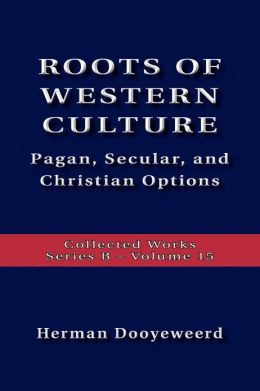 that have stood in the Kuyperian branch of neo-Calvinism have been of extraordinary importance. The unique philosophical insights of, say, Herman Dooyeweerd, or those who took up his call to do wholistic philosophical work in the spirit of Christ, informed by a healthy view of the story of Scripture, have been truly useful for various spheres of scholarship.
that have stood in the Kuyperian branch of neo-Calvinism have been of extraordinary importance. The unique philosophical insights of, say, Herman Dooyeweerd, or those who took up his call to do wholistic philosophical work in the spirit of Christ, informed by a healthy view of the story of Scripture, have been truly useful for various spheres of scholarship.
As I showed in my last post at BookNotes, I have my list of favorite books that are seminal and extraordinary in their fields (and I named a few.) And they are each influenced by the Kuyperian worldview assumptions, which is, among other things, partially why they are so insightful and wise and helpful for us as readers.
If you didn’t read my review of Schuurman’s Shaping a Digital World last week, I named four big things it does in the book, four of his “methods” or contributions that make him unique in his field. It is clear that he does these as a Kuyperian, and it is his neo-Calvinist perspective that gives him these insights. So, again, I say this to make a case that this tradition is vital, important, helpful, that it brings tools and gifts to the broader church and reading public that we should attend to.
Even if I’m partially right, you should be interested that this tradition has generated good fruit in recent years, contributed much to our common discourse, and shaping some of the best Christian books published (that are woefully under-recognized.) You should dig a bit deeper into this school of thought and faith tradition. It’ll do ya good.
THE CHALLENGE OF CULTURAL DISCIPLESHIP BY RICHARD J. MOUW
And that is why I want to close this long reflection with a rave about one book that explores these themes with rigor, with clarity, with remarkable grace, and that I think would be the “next step” into studying things “in the line of Kuyper.”&
nbsp; It is a book I’ve mentioned before, by a man I am increasingly realize is a genius, a notable scholar and an ecumenical leader who is incredibly well read, a gentleman of great stature, the President of Fuller Theological Seminary, (the world’s most multi-ethnic seminary, by the way) Dr. Richard Mouw.
Dr. Mouw, as I said earlier, has a little book about his own discovery of Kuyper, and in that book he offers a short, basic introduction that is a lovely primer. He ended up as a political philosopher at Calvin College in the 1970s when there were remarkable philosophers and other world-renowned scholars there, from Nicholas Woltersdorff to Evan Runner to Alvin Plantinga to Mark Noll. Some of Mouw’s vast knowledge of this robust strain of Dutch Calvinist thinking was deepened in his years of constant dialogue with some of the sharpest evangelical minds of the 20th century.
T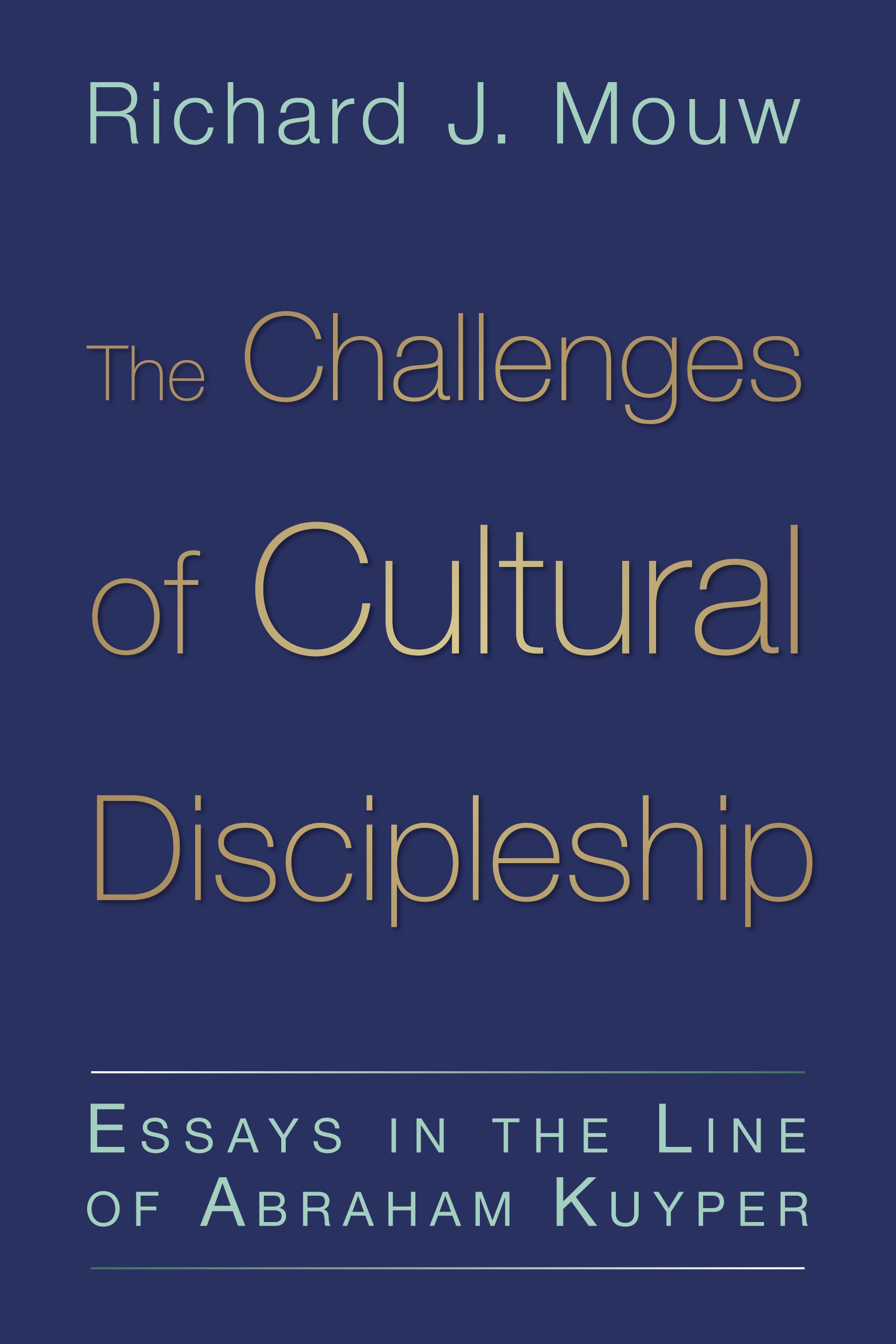 he Challenge of Cultural Discipleship: Essays in the Line of Abraham Kuyper by Richard Mouw (Eerdmans; $20.00) collects some of his scholarly work in this field and serves as a fantastic study on the history and legacy and relevance of the neo-Calvinist movement
he Challenge of Cultural Discipleship: Essays in the Line of Abraham Kuyper by Richard Mouw (Eerdmans; $20.00) collects some of his scholarly work in this field and serves as a fantastic study on the history and legacy and relevance of the neo-Calvinist movement
“In the line of Kuyper” is, as he explains, a Dutch expression, meaning in the heritage of, or in the same stream of thought as. Mouw is not slavishly committed to Kuyper’s every jot and tittle, not at all. But he is in his tradition, in his line. I like that.
Perhaps rather than merely tell you how much I learned from it, how very interesting it is, and how Dr. Mouw has this amazing ability to make often quite complex matters very clear, I will just list a few of the chapter titles. Please know that he ruminates and reflects even as he explains and teaches. Some of these papers or articles were once published in other books, and others were talks or lectures that he has given (including a spectacular one which was given at Princeton Seminary as the lecture given at the prestigious Kuyper Awards.) That one long chapter from the Princeton lecture alone is worth the price of admission — I have read it twice and will revisit it again, I’m sure.
Mouw is most able to frame various views by how they are or are not important, what they offer that is valuable, and how they do or don’t stand up to other, similar propositions or views. Anyone who likes pondering important theological truths or this visionary view of orthodox reformational cultural engagement will find buying this to be money very well spent. I wish more of us knew this stuff, that we were conversant in these ideas, names, notions. Mouw himself is a national treasure, and this book is itself a jewel of a gift. I highly recommend it.
Here are a few of the chapter titles.
These are my own favorites, and I hope you don’t think they are too daunting. (Even the one on the notoriously complex Herman Dooyeweerd is accessible and quite helpful.) For those wanting to deepen their insights into this generative tradition, or who wants refreshed in the old reformational movement, this book is a treasure chest, overflowing with good sentences, great ideas, and much, much, important learning.
- Calvin’s Legacy for Public Theology
- Culture, Church, and Civil Society: Abraham Kuyper for a New Century
- Some Reflections on Sphere Sovereignty
- Modal Diversity in Dooyeweerd’s Social Thought
- Law, Covenant, and Moral Commonalities: Some Neo-Calvinist Explorations
- Creational Politics: Some Calvinist Amendments
- Klaas Schilder as a Public Theologian
And there are more chapters in Challenges of… viz, a chapter about Dutch theological splits in which Kuyper played a role, a keep piece on infant baptism which is amazing, an important one about the nature of the modern seminary (and if it to be placed at and under the authority of the academy or the church, a matter of great consternation to Kuyper.) A few of these document “intra-Reformed” church discussions, and may be of lesser interest to those interested in neo-Calvinist public theology.
Anything by Rich Mouw is worth reading, though, and I commend his calm and reasonable style and his broad, informed knowledge of the subject to anyone who likes to learn, who loves good, intelligent discourse, and who wants to learn more about the Reformed faith lived out in contemporary social life. The Challenges of Cultural Discipleship is so carefully written, so learned and covers so much that I think it should be read by serious faith-based social thinkers, whether they want to be in the line of Kuyper or not. It is that important, or at least most of it is.
Here is a very short excerpt of one of the chapters from the Eerdmans webpage. I like this part, a story Mouw has told before, about the different instincts and phrases to describe things shared between he and his friend John Howard Yoder, the Mennonite scholar. “Created, but fallen,” is how Yoder once described Mouw’s Reformed view. “Created, but fallen,” is how Yoder preferred to put it. This is a great little expert. Check it out. And then order the book at our 20% off Hearts & Minds discount.
A FREE KUYPER BOOK (almost.)
Well, you’ve made it to the end of my overly wordy, admittedly repetitive rant. Maybe I wrote this as much for myself as for our readers. a reminder of my story, and what books I find to be most basic, foundational. I appreciate your reading along over my shoulder, as this may help clarify your own story, too.
If you’ve read this far, we’ll reward you.
Clicking HERE takes you over to our Hearts & Minds website order form page and we will send to you, for free, an important book written by Abraham Kuyper, a book that is considered by some a true classic, The Problem With Poverty edited by James Skillen (Baker.) All you have to do is type in that you want it, and be willing to pay $5 shipping.
send to you, for free, an important book written by Abraham Kuyper, a book that is considered by some a true classic, The Problem With Poverty edited by James Skillen (Baker.) All you have to do is type in that you want it, and be willing to pay $5 shipping.
This book’s message was orginally offered as an address at the first Christian Social Congress in The Netherlands on November 9th 1891. It was then, I believe, published as Christianity and the Class Struggle. This short but heady book showed — I love this stuff! — how a uniquely Christian and mature Reformed view ought to be, frankly, different than what we today might call the right or the left. Kuyper clearly calls us to great concern about poverty and offers astute insight into the nature of industrial-age problems, the dignity of workers and such. But he is critical of standard formulations of free market capitalism, even as he is very hard on Marxist views.
Conservatives might be struck by how much he sounds like a “peace and justice” advocate today, using the Bible to remind us of God’s great concern for the poor and for public righteousness. Liberals, though, might be challenged as he exposes some weaknesses of a society that relies on the State perhaps more than it should. That is, he forges a creative “third way” between the standard options! He isn’t exactly what today we would call in the US a Republican and he i
sn’t what we’d call a Democrat. Oh, my, if we had more who thought like this today!
This grand speech was given about the time of the famous Catholic Rerum Novarum by Pope Leo XIII and may stand with that as one of the best, most thoughtful and powerful declarations of Christian social policy of that era.
Our friends at the Center for Public Justice reprinted it several years ago in a fresh translation and through the generosity of Jim Skillen, their former executive director, made some available to us. We are happy to send them out for free.
Here’s the thing, again: shipping would cost us about $5. We’ll send this important book at no charge if you pay the shipping. I wish we could afford to do the shipping gratis, but it might add up, and you know we’re not quite able to do that.
Of course, we can add it in for free the next time you place an order.
If you want two, we have plenty. Just ask. (No extra shipping charge for two, either.)
When you go to our order form page, as always, you just have to type in what you want. If you type in The Problem of Poverty and we know to send it at no charge. The page is certified secure so you can put your cc in and we will just charge you the $5 for the media mail shipping.
This offer for a free book is good until June 30 2013
–
while supplies last-
special offer
20% off
any book mentioned
plus we send the free copy of
The Problem of Poverty
order heretakes you to the secure Hearts & Minds order form pagejust tell us what you want
inquire here
if you have questions or need more information
just ask us what you want to know
Hearts & Minds 234 East Main Street Dallastown, PA 17313 717-246-3333
read@heartsandmindsbooks.com

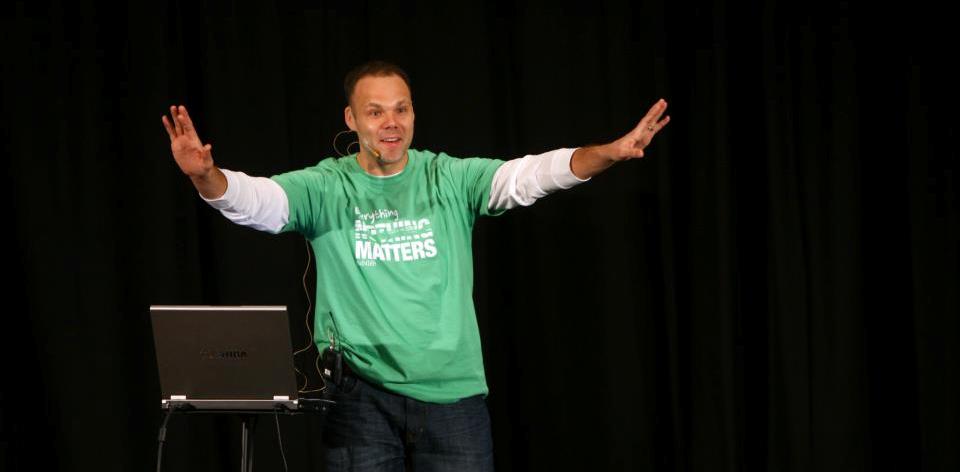 Derek Melleby in action.
Derek Melleby in action. Once you sign up (and you have to sign up, being it’s a webinar, after all) you can tune in live at 1:00 EDT this Thursday and you’ll be regaled with stories from the front lines of bookselling, Hearts & Minds style. Derek will set me up to preach a bit about the significance of reading, why studying to develop the mind of Christ is so very important these days, and why the organization for which he works (CPYU) and his own ministry (College Transition Initiative) values what we do here at the shop. I’ll tell some stories — maybe from church history, maybe from our experience — of how books well-chosen and carefully read can be life-changing. We think that reading is a good pleasure and a necessary spiritual discipline. The best leaders and cultural influencers are readers.
Once you sign up (and you have to sign up, being it’s a webinar, after all) you can tune in live at 1:00 EDT this Thursday and you’ll be regaled with stories from the front lines of bookselling, Hearts & Minds style. Derek will set me up to preach a bit about the significance of reading, why studying to develop the mind of Christ is so very important these days, and why the organization for which he works (CPYU) and his own ministry (College Transition Initiative) values what we do here at the shop. I’ll tell some stories — maybe from church history, maybe from our experience — of how books well-chosen and carefully read can be life-changing. We think that reading is a good pleasure and a necessary spiritual discipline. The best leaders and cultural influencers are readers.  reputation of not being able to list just a few books. We’ve announced it as a Top Ten List for your summer reading. But noooo (spoiler alert!) I couldn’t do that. So it will be Top Ten categories, with a handful of suggestions under each one. Sort of a “choose your own” Top Ten Summer List.
reputation of not being able to list just a few books. We’ve announced it as a Top Ten List for your summer reading. But noooo (spoiler alert!) I couldn’t do that. So it will be Top Ten categories, with a handful of suggestions under each one. Sort of a “choose your own” Top Ten Summer List. signs up gets that. And, all of these books will then be on a special sizzlin’ summer sale — 20% off. Or, I could say, a wonderful, wacky, winsome, webinar, sale. Yep, that’s a special discount just for those who sign up for the CPYU webinar.
signs up gets that. And, all of these books will then be on a special sizzlin’ summer sale — 20% off. Or, I could say, a wonderful, wacky, winsome, webinar, sale. Yep, that’s a special discount just for those who sign up for the CPYU webinar.
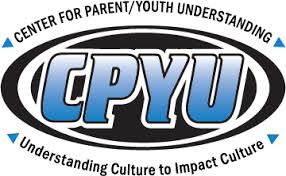
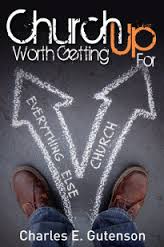 hurch Worth Getting Up For Charles Gutenson (Abingdon) $16.99 Gutenson has done community development, health care ministry, public justice work, has been on staff at Sojourners, and now teaches systematic theology at Asbury Theological Seminary. A recent book looked at the practices of the early church (The Right Church.) This is a distillation of much of his thought about congregational life that is vibrant, meaningful, missional, and inviting. He is a good writer, and this is exciting and clear; visionary and practical. He highlights well how churches must contextualize their ministry to their local setting and reminds us of the need to keep younger adults involved.
hurch Worth Getting Up For Charles Gutenson (Abingdon) $16.99 Gutenson has done community development, health care ministry, public justice work, has been on staff at Sojourners, and now teaches systematic theology at Asbury Theological Seminary. A recent book looked at the practices of the early church (The Right Church.) This is a distillation of much of his thought about congregational life that is vibrant, meaningful, missional, and inviting. He is a good writer, and this is exciting and clear; visionary and practical. He highlights well how churches must contextualize their ministry to their local setting and reminds us of the need to keep younger adults involved. 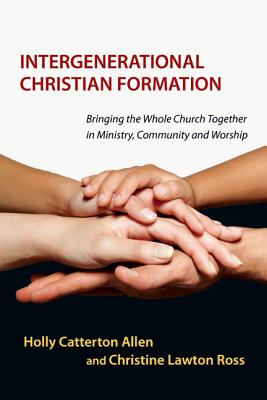 ntergenerational Christian Formation: Bringing the Whole Church Together in Ministry, Community, and Worship Holly Catterton Allen and Christian Lawton Ross (IVP Academic) $22.00 It is always a delight to see mainline denominational leaders (in this case, Karen Marie Yust, whose books are on Chalice Press, and who works at Union Presbyterian in Richmond) endorsing books on historically evangelically publishing houses. There is little doubt in my mind that this is the definitive book thus far on this vexing and much-debated topic. How do we live out Psalm 145: 4 which invite one generation to commend God’s redemptive words to the next? Allen and Ross have given us a comprehensive, thorough, systematic, and provocative study. This rejects seeing church as largely (market-derived) demographics — which may appeal to what one friend calls “generational narcissism.” There is practical stuff here, but it isn’t mostly a how-to handbook. It is a rich, serious, mature rumination on the theology of church, the nature of Christian pedagogy, and what it means to be an inter-generational, diverse Body of learners together. They look at worship, education, service and more.
ntergenerational Christian Formation: Bringing the Whole Church Together in Ministry, Community, and Worship Holly Catterton Allen and Christian Lawton Ross (IVP Academic) $22.00 It is always a delight to see mainline denominational leaders (in this case, Karen Marie Yust, whose books are on Chalice Press, and who works at Union Presbyterian in Richmond) endorsing books on historically evangelically publishing houses. There is little doubt in my mind that this is the definitive book thus far on this vexing and much-debated topic. How do we live out Psalm 145: 4 which invite one generation to commend God’s redemptive words to the next? Allen and Ross have given us a comprehensive, thorough, systematic, and provocative study. This rejects seeing church as largely (market-derived) demographics — which may appeal to what one friend calls “generational narcissism.” There is practical stuff here, but it isn’t mostly a how-to handbook. It is a rich, serious, mature rumination on the theology of church, the nature of Christian pedagogy, and what it means to be an inter-generational, diverse Body of learners together. They look at worship, education, service and more.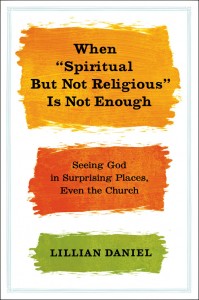 Even the Church Lillian Daniel (Jericho Books) $19.99 You may know I promoted this earlier in the spring, naming it as a certain front-runner for my favorite book of the year, especially in the category of short, devotional essays. I think I filed this under memoir. And it is memoir-like; Lillian is a great storyteller, good, good writer, and a wise reporter, calling out sightings of Godly life here and there, as she sees it. Alas, she sees it — surprise! — in ordinary stuff of ordinary churches.
Even the Church Lillian Daniel (Jericho Books) $19.99 You may know I promoted this earlier in the spring, naming it as a certain front-runner for my favorite book of the year, especially in the category of short, devotional essays. I think I filed this under memoir. And it is memoir-like; Lillian is a great storyteller, good, good writer, and a wise reporter, calling out sightings of Godly life here and there, as she sees it. Alas, she sees it — surprise! — in ordinary stuff of ordinary churches. 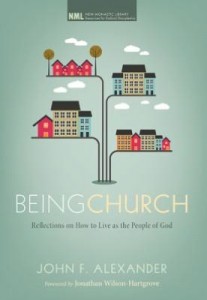 eing Church: Reflections on How to Live as the People of God John F. Alexander (Casc
eing Church: Reflections on How to Live as the People of God John F. Alexander (Casc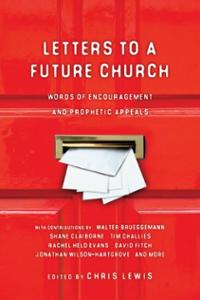 etters to a Future Church: Words of Encouragement and Prophetic Appeals edited by Chris Lewis (IVP) $15.00 We all know the letters to churches in the early part of Revelation. Suppose the Spirit was inspiring people to write to churches today. Suppose you could write a letter to church folk you know? You have one shot — what would you say? How would you say it? Lewis compiled this marvelously interesting, provocative, and stimulating book as a set of letters from all sorts of leaders, mainline and evangelical, Reformed and otherwise, social action-oriented and profoundly contemplative. As the sub-title suggests there are gentle works of good encouragement and there are hard-hitting calls to prophetic action. Here, you’ll real missives from Shane Claiborne and Tim Challies, from Rachel Held Evans and Walter Brueggemann. There are pieces by John Ortberg and Will Willimon. The famous black preacher Gardner Taylor has an eloquent piece and so does Eugene Peterson.
etters to a Future Church: Words of Encouragement and Prophetic Appeals edited by Chris Lewis (IVP) $15.00 We all know the letters to churches in the early part of Revelation. Suppose the Spirit was inspiring people to write to churches today. Suppose you could write a letter to church folk you know? You have one shot — what would you say? How would you say it? Lewis compiled this marvelously interesting, provocative, and stimulating book as a set of letters from all sorts of leaders, mainline and evangelical, Reformed and otherwise, social action-oriented and profoundly contemplative. As the sub-title suggests there are gentle works of good encouragement and there are hard-hitting calls to prophetic action. Here, you’ll real missives from Shane Claiborne and Tim Challies, from Rachel Held Evans and Walter Brueggemann. There are pieces by John Ortberg and Will Willimon. The famous black preacher Gardner Taylor has an eloquent piece and so does Eugene Peterson. 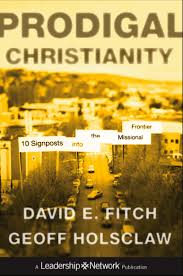 rodigal Christianity: 10 Signposts into the Missional Frontier David Fitch & Geoff Holsclaw (Jossey Bass) $24.95 I have respected these two deep thinkers for quite some time, and was glad to see this new book in the esteemed, useful “Leadership Network” series. I am not necessarily Anabaptist, but I greatly appreciate that Fitch and Holsclaw have brought a serious commitment to local body life in light of Yoder and other Mennonite theologians in their broad contribution to missional church conversation. That this book has gotten rave reviews from Scot McKnight, Alan Hirsch, Alan Roxburgh and others speaks a lot. They are both scholars and practitioners, so I want to hear their story. I have not read this yet, but believe me, after just looking at the table of contents (and some videos of them speaking about it on line) I was hooked. It is on my stack, one I will personally work through this summer. I like what Gary Nelson, President of Tyndale University and Seminary in Toronto says, (they) “do something with Prodigal Christianity that most authors can’t pull off. They hold the tension between the prophetic and the priestly. As a result they make some readers squirm and others question.” I like that there is an emphasis on the local, on being an incarnation of the gospel in the neighborhood. I think these “10 Signposts into the Missional Frontier” are good pointers, and we should join the journey.
rodigal Christianity: 10 Signposts into the Missional Frontier David Fitch & Geoff Holsclaw (Jossey Bass) $24.95 I have respected these two deep thinkers for quite some time, and was glad to see this new book in the esteemed, useful “Leadership Network” series. I am not necessarily Anabaptist, but I greatly appreciate that Fitch and Holsclaw have brought a serious commitment to local body life in light of Yoder and other Mennonite theologians in their broad contribution to missional church conversation. That this book has gotten rave reviews from Scot McKnight, Alan Hirsch, Alan Roxburgh and others speaks a lot. They are both scholars and practitioners, so I want to hear their story. I have not read this yet, but believe me, after just looking at the table of contents (and some videos of them speaking about it on line) I was hooked. It is on my stack, one I will personally work through this summer. I like what Gary Nelson, President of Tyndale University and Seminary in Toronto says, (they) “do something with Prodigal Christianity that most authors can’t pull off. They hold the tension between the prophetic and the priestly. As a result they make some readers squirm and others question.” I like that there is an emphasis on the local, on being an incarnation of the gospel in the neighborhood. I think these “10 Signposts into the Missional Frontier” are good pointers, and we should join the journey. a heart-felt cry but too long to share here at BookNotes so I posted it as a “column” at the website, where I publish longer pieces and bigger lists. I hope you read that ramble through reformational distinctives, some of the problems with the too-narrowly focused (so-called) new Calvinists, and why many churches – mainline denominational and indie evangelical alike — despite their best theological instincts, sometimes fail to offer a rigorous, embodied, practical “in the world but not of it” sort of perspective for faithful cultural engagement.
a heart-felt cry but too long to share here at BookNotes so I posted it as a “column” at the website, where I publish longer pieces and bigger lists. I hope you read that ramble through reformational distinctives, some of the problems with the too-narrowly focused (so-called) new Calvinists, and why many churches – mainline denominational and indie evangelical alike — despite their best theological instincts, sometimes fail to offer a rigorous, embodied, practical “in the world but not of it” sort of perspective for faithful cultural engagement.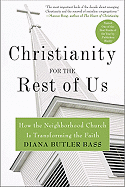 is Transforming the Faith (HarperOne; $14.99) by my friend Diana Butler Bass. Whether you are firmly situated in a ordinary, traditional congregation, or a hipster new church plant, or a conservative-leaning community or mega-church, seeing the practices she holds up and reading the stories of smaller, faithful churches doing good Kingdom work is helpful. This book was hugely popular a few years ago and I think remains a classic in the field.
is Transforming the Faith (HarperOne; $14.99) by my friend Diana Butler Bass. Whether you are firmly situated in a ordinary, traditional congregation, or a hipster new church plant, or a conservative-leaning community or mega-church, seeing the practices she holds up and reading the stories of smaller, faithful churches doing good Kingdom work is helpful. This book was hugely popular a few years ago and I think remains a classic in the field. 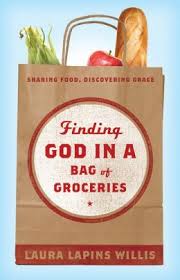 inding God in a Bag of Groceries: Sharing Food, Discovering Grace Laura Lapins Willis (Abingdon) $15.99 Leave it to a major mainline publisher to have an endorsement by Desmond Tutu, Franciscan guru Richard Rohr and Pulitzer Prize-winning historian and journalist Jon Meacham. This is a great example of what mainline churches have done well for generations – motivated people who, without much hoopla, get in their cars and deliver food to others. (Both Beth and I grew up knowing our parents were involved in the service called “Meals on Wheels.” This memoir tells of a woman who considered becoming a priest, got involved in a small food pantry, and came to realize how this ministry of offering food to others transformed her own soul. Don’t we all hunger, for God and sustenance, for community and justice and love? This is a great story by a good writer and experienced community organizer. I’m glad for the social service witness of our friends here in the display hall, where
inding God in a Bag of Groceries: Sharing Food, Discovering Grace Laura Lapins Willis (Abingdon) $15.99 Leave it to a major mainline publisher to have an endorsement by Desmond Tutu, Franciscan guru Richard Rohr and Pulitzer Prize-winning historian and journalist Jon Meacham. This is a great example of what mainline churches have done well for generations – motivated people who, without much hoopla, get in their cars and deliver food to others. (Both Beth and I grew up knowing our parents were involved in the service called “Meals on Wheels.” This memoir tells of a woman who considered becoming a priest, got involved in a small food pantry, and came to realize how this ministry of offering food to others transformed her own soul. Don’t we all hunger, for God and sustenance, for community and justice and love? This is a great story by a good writer and experienced community organizer. I’m glad for the social service witness of our friends here in the display hall, where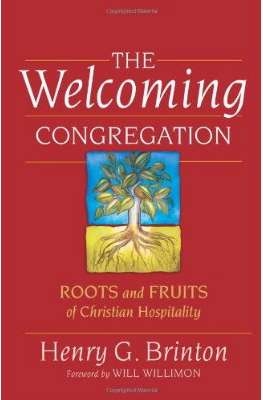 he Welcoming Congregation: Roots and Fruits of Christian Hospitality Henry G. Brinton (Westminster/John Knox) $17.00 Mainline churches are all abuzz talking about hospitality, inclusion, graciousness. They are right about this, of course, that we are called to offer graceful welcome to all. There have been many writing on this lately, good studies, and this one is in their debt (that is, it is theologically rich and astute.) This is designed as a congregational study, a reflection on faithful practice of churches that build community and what comes of it all. Good reflection questions at the end of each chapter. This is a great read for anyone, and certain will offer guidance for those wanting to achieve greater openness and diversity. The author is senior pastor of Fairfax Presbyterian Church in Fairfax VA.
he Welcoming Congregation: Roots and Fruits of Christian Hospitality Henry G. Brinton (Westminster/John Knox) $17.00 Mainline churches are all abuzz talking about hospitality, inclusion, graciousness. They are right about this, of course, that we are called to offer graceful welcome to all. There have been many writing on this lately, good studies, and this one is in their debt (that is, it is theologically rich and astute.) This is designed as a congregational study, a reflection on faithful practice of churches that build community and what comes of it all. Good reflection questions at the end of each chapter. This is a great read for anyone, and certain will offer guidance for those wanting to achieve greater openness and diversity. The author is senior pastor of Fairfax Presbyterian Church in Fairfax VA.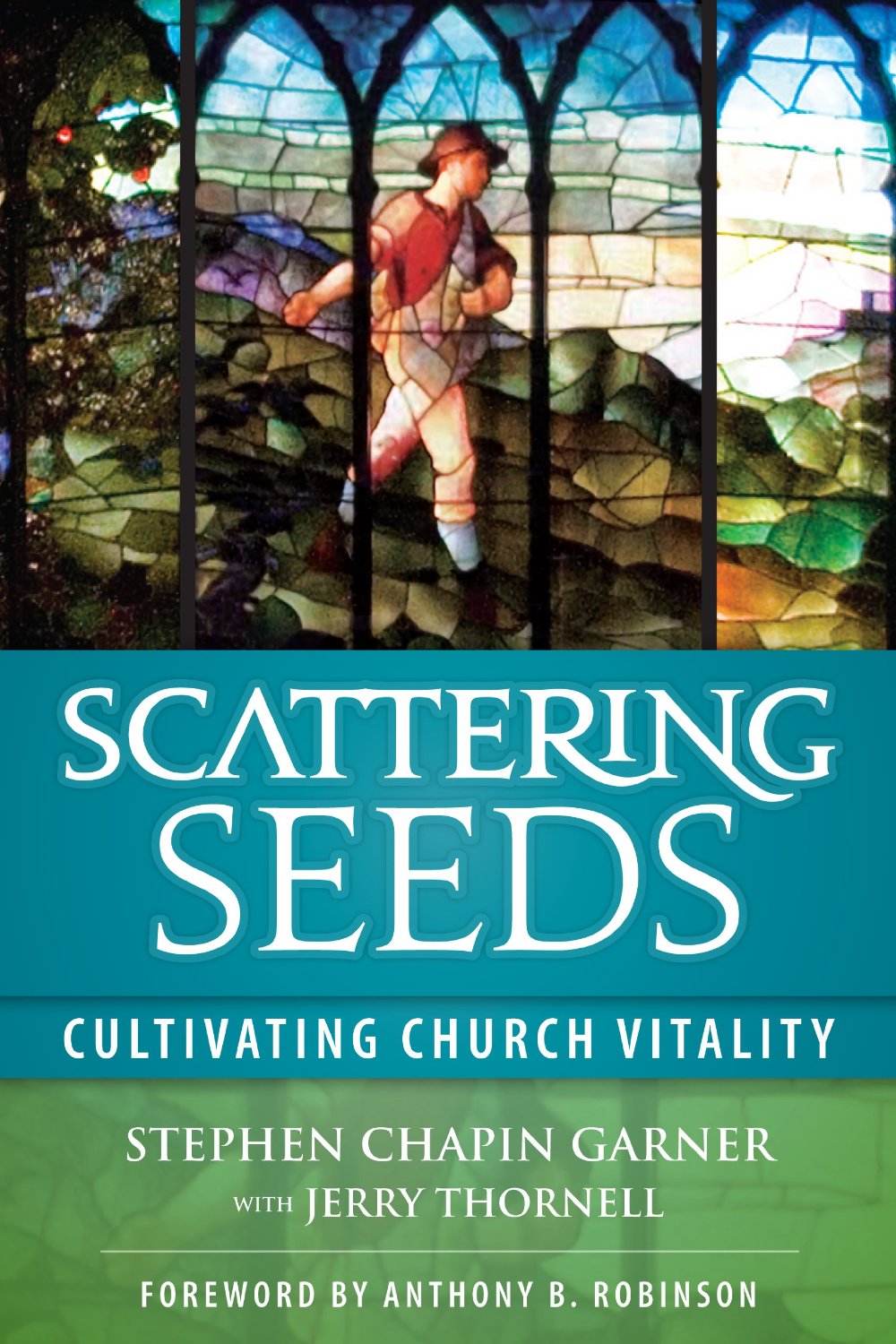 cattering Seeds: Cultivating Church Vitality Steven Chapin Garner and Jerry Thornell (Alban Institute) $17.00 This is a recent book published by the Alban Institute, a publisher that does many research-based, best-practices sorts of books for mainline church leaders. We take almost everything they do to these events, squeezing them all in. So many are useful, on church vitality, on leadership, on conflict or congregational systems, or congregational redevelopment and so much more.
cattering Seeds: Cultivating Church Vitality Steven Chapin Garner and Jerry Thornell (Alban Institute) $17.00 This is a recent book published by the Alban Institute, a publisher that does many research-based, best-practices sorts of books for mainline church leaders. We take almost everything they do to these events, squeezing them all in. So many are useful, on church vitality, on leadership, on conflict or congregational systems, or congregational redevelopment and so much more.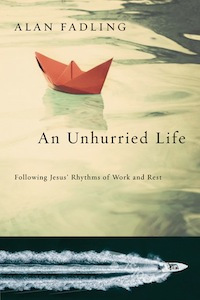 n Unhurried Life: Following Jesus’ Rhythms of Work and Rest Alan Fadling (IVP) $15.00 Mainline churches, like most people of faith these days, are interested in questions of spiritual formation, and know that principles of Sabbath are key to Biblical renewal. Doesn’t the cover of this book speak volumes – the go, go, go of the speedboat with much noise and splash in its wake, and the slower, quiet, but somehow appealing paper boat floating along at a more graceful human scale? Are you a recovering speed addict? Nobody suggests we ought not work hard and there are times we do have to go fast. But few of us have the work/rest rhythm quit right, so this book should have universal appeal. Jan Johnson (we sold her book Abundant Simplicity the first day here!) says of it “greatness of soul requires an unhurried life.” She interestingly says it is a perfect follow up to The Contemplative Pastor by Eugene Peterson. Whether you are a clergy person or not, this book is for you. It is very profound; highly recommended, wonderfully written, and certainly speaking wisely to one of the great concerns of our era.
n Unhurried Life: Following Jesus’ Rhythms of Work and Rest Alan Fadling (IVP) $15.00 Mainline churches, like most people of faith these days, are interested in questions of spiritual formation, and know that principles of Sabbath are key to Biblical renewal. Doesn’t the cover of this book speak volumes – the go, go, go of the speedboat with much noise and splash in its wake, and the slower, quiet, but somehow appealing paper boat floating along at a more graceful human scale? Are you a recovering speed addict? Nobody suggests we ought not work hard and there are times we do have to go fast. But few of us have the work/rest rhythm quit right, so this book should have universal appeal. Jan Johnson (we sold her book Abundant Simplicity the first day here!) says of it “greatness of soul requires an unhurried life.” She interestingly says it is a perfect follow up to The Contemplative Pastor by Eugene Peterson. Whether you are a clergy person or not, this book is for you. It is very profound; highly recommended, wonderfully written, and certainly speaking wisely to one of the great concerns of our era. hurch, World, and Kingdom: The Eucharistic Foundation of Alexander Schmemann’s Pastoral Theology William C. Mills (Hillenbrand Books) $18.00 We always feel at liberty to bring Catholic and Orthodox books to mainline events, and this Lutheran gathering certainly shows interest in the liturgical tradition. I hope you know the must-read For the Life of the World by Schmemann – it gets at the sacramental nature of an enchanted, being-redeemed creation as well as almost anything – and this study reflects on his view of pastoral work. As an Orthodox theologian, he wrote exquisitely about the assembly of God’s people in worship, and how liturgy shapes the calling of the pastor. Maybe you, like me, don’t know that much about Orthodox views of Baptism and Eucharist, but any pastoral leader could surely learn from this brief book. Kudos to Lutheran clergy who desire mature and faithful worship, and know that any renewal of public witness will emerge from ministries of Word and Sacrament.
hurch, World, and Kingdom: The Eucharistic Foundation of Alexander Schmemann’s Pastoral Theology William C. Mills (Hillenbrand Books) $18.00 We always feel at liberty to bring Catholic and Orthodox books to mainline events, and this Lutheran gathering certainly shows interest in the liturgical tradition. I hope you know the must-read For the Life of the World by Schmemann – it gets at the sacramental nature of an enchanted, being-redeemed creation as well as almost anything – and this study reflects on his view of pastoral work. As an Orthodox theologian, he wrote exquisitely about the assembly of God’s people in worship, and how liturgy shapes the calling of the pastor. Maybe you, like me, don’t know that much about Orthodox views of Baptism and Eucharist, but any pastoral leader could surely learn from this brief book. Kudos to Lutheran clergy who desire mature and faithful worship, and know that any renewal of public witness will emerge from ministries of Word and Sacrament.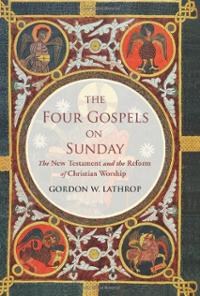 he Four Gospels on Sunday: The New Testament and the Reform of Christian Worship Gordon W. Lathrop (Fortress) $49.00 Lathrop is the renowned and vibrant professor from Lutheran Theological Seminary in Philadelphia. I have often talked about his heavy three-volume set Holy Things: A Liturgical Theology, Holy People: A Liturgical Ecclesiology and Holy Ground: A Liturgical Cosmology, a powerful trio that brings to mind the aforementioned Alexander Schmemann. Those are certainly worth reading. Lutherans should be glad for this new book which is both scholarly and beautiful, bringing together his two great specialties of Biblical studies and liturgics. We could all learn from this. This is a truly beautiful, solidly-made book, of great importance, but I wish it weren’t so expensive. I know it would sell better here if it were more reasonable. Maybe the discount will help.
he Four Gospels on Sunday: The New Testament and the Reform of Christian Worship Gordon W. Lathrop (Fortress) $49.00 Lathrop is the renowned and vibrant professor from Lutheran Theological Seminary in Philadelphia. I have often talked about his heavy three-volume set Holy Things: A Liturgical Theology, Holy People: A Liturgical Ecclesiology and Holy Ground: A Liturgical Cosmology, a powerful trio that brings to mind the aforementioned Alexander Schmemann. Those are certainly worth reading. Lutherans should be glad for this new book which is both scholarly and beautiful, bringing together his two great specialties of Biblical studies and liturgics. We could all learn from this. This is a truly beautiful, solidly-made book, of great importance, but I wish it weren’t so expensive. I know it would sell better here if it were more reasonable. Maybe the discount will help.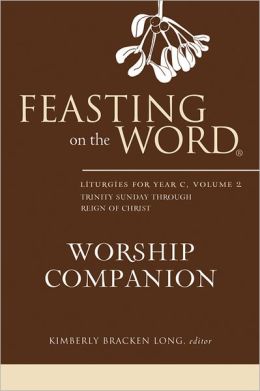 easting on the Word Worship Companion Year C Volume 2 edited by Kimberly Bracken Long (Westminster/John Knox) $35.00 Most of our readers know of the extraordinary resource called Feasting on the Word, co-edited by Barbara Brown Taylor, a four volume set of preaching commentaries on each text of the lectionary for each liturgical year. (That is, there are four volumes for Years A, B and C, making Feasting a 12 volume set, in all. Each volume offers four different perspectives on the pericapes of the day (an exegetical, theological, pastoral, and homiletical view) and they are by far the most talked about preaching resources we’ve seen in our 30 years of theological bookselling.) This new Worship Companion is the second of a two volume set for each year, offering liturgies drawn from Feasting. This one, obviously, is for use now, the second half of Year C. It starts on Trinity Sunday and ends right before Advent. There are weekly calls to worship, c
easting on the Word Worship Companion Year C Volume 2 edited by Kimberly Bracken Long (Westminster/John Knox) $35.00 Most of our readers know of the extraordinary resource called Feasting on the Word, co-edited by Barbara Brown Taylor, a four volume set of preaching commentaries on each text of the lectionary for each liturgical year. (That is, there are four volumes for Years A, B and C, making Feasting a 12 volume set, in all. Each volume offers four different perspectives on the pericapes of the day (an exegetical, theological, pastoral, and homiletical view) and they are by far the most talked about preaching resources we’ve seen in our 30 years of theological bookselling.) This new Worship Companion is the second of a two volume set for each year, offering liturgies drawn from Feasting. This one, obviously, is for use now, the second half of Year C. It starts on Trinity Sunday and ends right before Advent. There are weekly calls to worship, c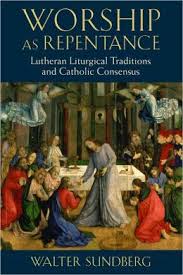 orship as Repentance: Lutheran Liturgical Traditions and Catholic
orship as Repentance: Lutheran Liturgical Traditions and Catholic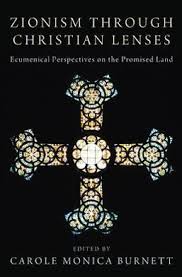 ionism Through Christian Lenses: Ecumenical Perspectives on the Promised Land edited by Carole Monica Burnett (Pickwick) $25.00 I am sure you know that mainline churches are strong on public justice advocacy, that their global denominational connections allow them to be in communion with brothers and sisters all over the world. In this powerful collection of essays you can get solid, Scripturally informed and political contextualized chapters by a Lutheran, two Roman Catholics, two Episcopalians, an American Baptist, and Eastern Orthodox Christian and a UCC pastor. This explores ancient Israel’s covenant, the early church’s theological insights and the post-Reformation experiences of various branches of Christianity around this question of whether we are called to be pro-Zionist. Naim S. Ateek, the Director of Sabeel Ecumenical Liberation Theology Center in Jerusalem wrote the passionate forward. The author, by the way, is not only a peace and justice advocate in the Middle East, but is an editor of the Fathers of the Church series and an adjunct professor of Latin and New Testament Greek at the Dominican House of Studies in DC. We’ve met, and I can assure you she is sharp and thoughtful. This is an excellent book. I am glad for the way mainline Christians have led the way to a balanced concern for peace in the Holy Land.
ionism Through Christian Lenses: Ecumenical Perspectives on the Promised Land edited by Carole Monica Burnett (Pickwick) $25.00 I am sure you know that mainline churches are strong on public justice advocacy, that their global denominational connections allow them to be in communion with brothers and sisters all over the world. In this powerful collection of essays you can get solid, Scripturally informed and political contextualized chapters by a Lutheran, two Roman Catholics, two Episcopalians, an American Baptist, and Eastern Orthodox Christian and a UCC pastor. This explores ancient Israel’s covenant, the early church’s theological insights and the post-Reformation experiences of various branches of Christianity around this question of whether we are called to be pro-Zionist. Naim S. Ateek, the Director of Sabeel Ecumenical Liberation Theology Center in Jerusalem wrote the passionate forward. The author, by the way, is not only a peace and justice advocate in the Middle East, but is an editor of the Fathers of the Church series and an adjunct professor of Latin and New Testament Greek at the Dominican House of Studies in DC. We’ve met, and I can assure you she is sharp and thoughtful. This is an excellent book. I am glad for the way mainline Christians have led the way to a balanced concern for peace in the Holy Land.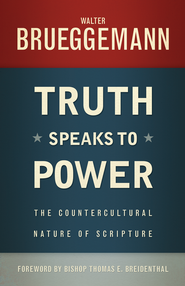 ruth Speaks to Power: The Countercultural Nature of Scripture Walter Brueggemann (Westminster/John Knox) $17.00 We take Brueggemann books anywhere we go where we take Bible stuff, and, naturally, he is esteemed in all sorts of circles. Lutherans know him as their publisher (Fortress) did many of his most famous books such as The Land, The Prophetic Imagination, and The Hopeful Imagination. We are featuring a big stack of these right alongside others of his. As I have mentioned in a previous BookNotes, he here looks at Moses, Solomon, Elisha, Josiah, and a final chapter called “Power and Truth Among Us.” Amazing. Just amazing. You should order this. Kudos to those in the mainline churches who have, in recent decades, redoubled their efforts to do serious Bible study in their parishes. I know there are some traditional denominations, who don’t have a particularly conservative view of the Scriptures, who study it more frequently and with more delight and intensity than their evangelical neighbors, who insist loudly that they are Bible-believing, but actually don’t study it that much.
ruth Speaks to Power: The Countercultural Nature of Scripture Walter Brueggemann (Westminster/John Knox) $17.00 We take Brueggemann books anywhere we go where we take Bible stuff, and, naturally, he is esteemed in all sorts of circles. Lutherans know him as their publisher (Fortress) did many of his most famous books such as The Land, The Prophetic Imagination, and The Hopeful Imagination. We are featuring a big stack of these right alongside others of his. As I have mentioned in a previous BookNotes, he here looks at Moses, Solomon, Elisha, Josiah, and a final chapter called “Power and Truth Among Us.” Amazing. Just amazing. You should order this. Kudos to those in the mainline churches who have, in recent decades, redoubled their efforts to do serious Bible study in their parishes. I know there are some traditional denominations, who don’t have a particularly conservative view of the Scriptures, who study it more frequently and with more delight and intensity than their evangelical neighbors, who insist loudly that they are Bible-believing, but actually don’t study it that much.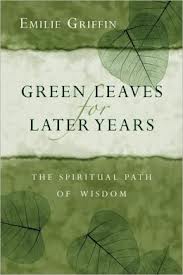 reen Leaves for Later Years: The Spiritual Path of Wisdom Emilie Griffin (IVP/formatio) $15.00 Mainline pastors have been schooled well in pastoral care and it is evident that aging issues remain important for their congregations. We take books about the greying of the church to all our religious events, and they are always discussed. Here is one that we’ve sold a number of – Emilie Griffin is the author of a number of books, including some classics of contemplative spirituality; she knows formational literature very well, and has worked in this field a long time. Her good writing and her own life stage allows her here to offer a nearly one-of-a-kind book. It is ideal for individuals or groups; it has great reflection questions and a prayer. So well written – very highly recommended. By the way, we take all the formatio imprint of IVP almost everywhere we go — some of the very best stuff on spirituality out there.
reen Leaves for Later Years: The Spiritual Path of Wisdom Emilie Griffin (IVP/formatio) $15.00 Mainline pastors have been schooled well in pastoral care and it is evident that aging issues remain important for their congregations. We take books about the greying of the church to all our religious events, and they are always discussed. Here is one that we’ve sold a number of – Emilie Griffin is the author of a number of books, including some classics of contemplative spirituality; she knows formational literature very well, and has worked in this field a long time. Her good writing and her own life stage allows her here to offer a nearly one-of-a-kind book. It is ideal for individuals or groups; it has great reflection questions and a prayer. So well written – very highly recommended. By the way, we take all the formatio imprint of IVP almost everywhere we go — some of the very best stuff on spirituality out there.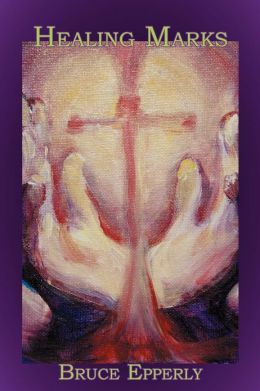 ealing Marks Bruce Epperly (Energion Publications) $14.99 Bruce Epperly gets around and is well known in many circles – he is a Disciples pastor, not long ago served Lancaster Theological Seminar tirelessly and is the author of oodles of books. He has published with the esteemed Alban Institute (we carry all his Alban titles, which are very well done) and he has worked with larger and smaller presses. Here, in a book that ought to be well known, he offers a study of healing and spirituality (mostly from Mark’s gospel.) Healing is multi-faceted and grace-filled. As his friend Kent Ira Groff writes on the back, “Jesus’ touching dirt-poor sick folks and well-heeled tax collectors bids us to spiritual practices and social justice using scientific tools.” That is, it is grounded in a critical study of the Biblical texts, uses deep psychological awareness to see touches of grace and healing that comes in many forms, and it is medically sound. (Bruce spent more than a decade as chaplain at Georgetown University Medical School where he also taught, innovating courses on faith, medicine, healing and wholeness. This isn’t a book of cheap miracles, but neither does it keep gospel transformation at arm’s length. It is fascinating to see how many mainline churches anoint with oil and have (liturgically-oriented) healing services. We have this propped up for all to see. And many of his other titles, too.
ealing Marks Bruce Epperly (Energion Publications) $14.99 Bruce Epperly gets around and is well known in many circles – he is a Disciples pastor, not long ago served Lancaster Theological Seminar tirelessly and is the author of oodles of books. He has published with the esteemed Alban Institute (we carry all his Alban titles, which are very well done) and he has worked with larger and smaller presses. Here, in a book that ought to be well known, he offers a study of healing and spirituality (mostly from Mark’s gospel.) Healing is multi-faceted and grace-filled. As his friend Kent Ira Groff writes on the back, “Jesus’ touching dirt-poor sick folks and well-heeled tax collectors bids us to spiritual practices and social justice using scientific tools.” That is, it is grounded in a critical study of the Biblical texts, uses deep psychological awareness to see touches of grace and healing that comes in many forms, and it is medically sound. (Bruce spent more than a decade as chaplain at Georgetown University Medical School where he also taught, innovating courses on faith, medicine, healing and wholeness. This isn’t a book of cheap miracles, but neither does it keep gospel transformation at arm’s length. It is fascinating to see how many mainline churches anoint with oil and have (liturgically-oriented) healing services. We have this propped up for all to see. And many of his other titles, too.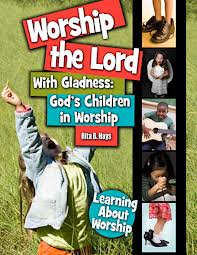 orship the Lord with Gladness: God’s Children in Worship
orship the Lord with Gladness: God’s Children in Worship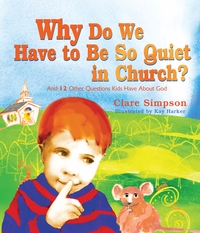 hy Do We Have to Be Quiet in Church? And 12 Other Questions Kids Have About God Clare Simpson (Paraclete) $14.99 This small hardback is a lovely little book, with great illustrations by Kay Harker, and is designed to answer typical questions younger children have about God and faith and church. We like this book and it is great here for at least three good reasons: it has a modern, contemporary feel; that is, it is artful and not too silly or cartoony. Secondly, it has nuance and allusive hints to applying truth, unlike some books that are so didactic and heavy-handed. Thirdly, there are small hints of scenes of mainline church settings – pews, a pastor in a clerical collar, a Baptismal font. Children who attend ordinary mainline churches will recognize themselves in this. Why Do We Have To Be So Quiet in Church is a great little book, short and sweet, published by a contemplative Episcopalian publisher that we love. That mouse is cool, too, eh? Thanks to the Lutheran folk who bought kids books at their Assembly. Kudos to all congregations who make room for kids of all ages and temperaments and needs. We have many, many more children’s books – I’ll list some others before too long.
hy Do We Have to Be Quiet in Church? And 12 Other Questions Kids Have About God Clare Simpson (Paraclete) $14.99 This small hardback is a lovely little book, with great illustrations by Kay Harker, and is designed to answer typical questions younger children have about God and faith and church. We like this book and it is great here for at least three good reasons: it has a modern, contemporary feel; that is, it is artful and not too silly or cartoony. Secondly, it has nuance and allusive hints to applying truth, unlike some books that are so didactic and heavy-handed. Thirdly, there are small hints of scenes of mainline church settings – pews, a pastor in a clerical collar, a Baptismal font. Children who attend ordinary mainline churches will recognize themselves in this. Why Do We Have To Be So Quiet in Church is a great little book, short and sweet, published by a contemplative Episcopalian publisher that we love. That mouse is cool, too, eh? Thanks to the Lutheran folk who bought kids books at their Assembly. Kudos to all congregations who make room for kids of all ages and temperaments and needs. We have many, many more children’s books – I’ll list some others before too long. 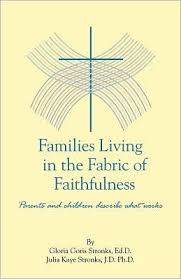 amilies Living in the Fabric of Faithfulness: Parents and Children Describe What Works Gloria Stronks and Julie Stronks (Outskirts Press) $18.95 Despite the bland cover, this is a book that I am confident will stretch you, make you think, invite you to deeper conversations, and will help you develop a worldview that is sufficient for the changing times and complex cultural crisis of the coming years. The allusion in the title to Steve Garber’s serious, must-read study (you’ve heard us mention it here often) The Fabric of Faithfulness: Weaving Together Believe and Behavior (IVP; $17.00) is intentional. It is a book taking Garber’s book and applying it to parenting. Stronks and Stronks have taught Garber’s book for years; they are educators and philosophizing moms, they are home-makers with a profound vision of how to struggle to raise families of compassion and service. They live the upside-down values of the ways of Jesus, in and for the world.
amilies Living in the Fabric of Faithfulness: Parents and Children Describe What Works Gloria Stronks and Julie Stronks (Outskirts Press) $18.95 Despite the bland cover, this is a book that I am confident will stretch you, make you think, invite you to deeper conversations, and will help you develop a worldview that is sufficient for the changing times and complex cultural crisis of the coming years. The allusion in the title to Steve Garber’s serious, must-read study (you’ve heard us mention it here often) The Fabric of Faithfulness: Weaving Together Believe and Behavior (IVP; $17.00) is intentional. It is a book taking Garber’s book and applying it to parenting. Stronks and Stronks have taught Garber’s book for years; they are educators and philosophizing moms, they are home-makers with a profound vision of how to struggle to raise families of compassion and service. They live the upside-down values of the ways of Jesus, in and for the world.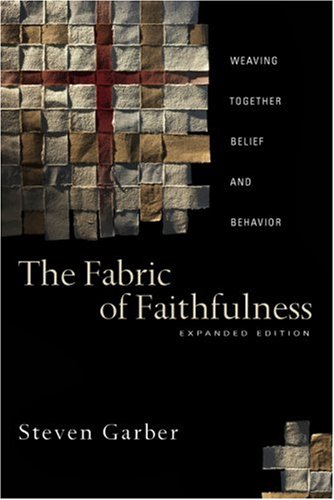 one nurture sustainable, life-long faith, lived without cynicism, but with hope and vitality?
one nurture sustainable, life-long faith, lived without cynicism, but with hope and vitality?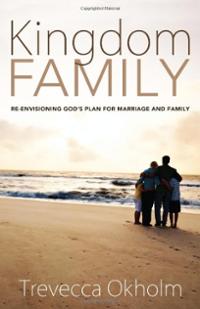 ingdom Family: Re-Envisioning God’s Plan for Marriage and Family Trevecca Okholm (Cascade Books) $22.00 There are a lot of books by professional Christian educators and church school instructors, but it seems to me that most books on marriage and family are not written by those who do ministry with children. This woman has served for decades, currently at St. Andrew’s Presbyterian (USA) Church in Newport Beach. With an MA in Educational Ministries from Wheaton Graduate School, she knows what she’s doing. Her book should be better known among us.
ingdom Family: Re-Envisioning God’s Plan for Marriage and Family Trevecca Okholm (Cascade Books) $22.00 There are a lot of books by professional Christian educators and church school instructors, but it seems to me that most books on marriage and family are not written by those who do ministry with children. This woman has served for decades, currently at St. Andrew’s Presbyterian (USA) Church in Newport Beach. With an MA in Educational Ministries from Wheaton Graduate School, she knows what she’s doing. Her book should be better known among us. 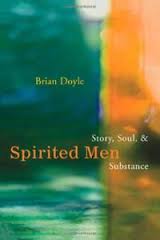 pirited Men: Story, Soul, & Substance Brian Doyle (Cowley) $14.95 We only have a few of these left (it has gone out of print) but wanted to highlight it as it is so very interesting and, admittedly, a bit unusual. You may know Doyle as a fabulous Catholic writer, poet, storyteller, teacher. He is the editor of the esteemed Portland Magazine. There are endorsements on the back from poet Mary Oliver and the novelist David James Duncan, which gives you a huge clue to its caliber. Here, Father Doyle ruminates in colorful prose about interesting soul men — from Van Morrison to Robert Louis Stevenson. What other book about men has a chapter on Plutarch of Greece (or William Blake or James Joyce?) Yep, many of these guys are shaped by their lives in the British Isles. But there is an Australian, an American jazz man (Paul Desmond) and an American children’s author. Many you have heard of and a few you haven’t. Boyle suggests that he is offering “resurrections, restoration, reconsiderations, appreciations, enthusiasm, head-long solos, laughing prayers, imaginary meetings with most unusual and interesting men.” Wow.
pirited Men: Story, Soul, & Substance Brian Doyle (Cowley) $14.95 We only have a few of these left (it has gone out of print) but wanted to highlight it as it is so very interesting and, admittedly, a bit unusual. You may know Doyle as a fabulous Catholic writer, poet, storyteller, teacher. He is the editor of the esteemed Portland Magazine. There are endorsements on the back from poet Mary Oliver and the novelist David James Duncan, which gives you a huge clue to its caliber. Here, Father Doyle ruminates in colorful prose about interesting soul men — from Van Morrison to Robert Louis Stevenson. What other book about men has a chapter on Plutarch of Greece (or William Blake or James Joyce?) Yep, many of these guys are shaped by their lives in the British Isles. But there is an Australian, an American jazz man (Paul Desmond) and an American children’s author. Many you have heard of and a few you haven’t. Boyle suggests that he is offering “resurrections, restoration, reconsiderations, appreciations, enthusiasm, head-long solos, laughing prayers, imaginary meetings with most unusual and interesting men.” Wow. ultivating Reality: How the Soil Might Save Us Regan
ultivating Reality: How the Soil Might Save Us Regan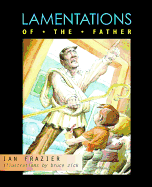 Lamentations of the Father Ian Frazier (WJK) $10.95 I almost forgot about this — we had so much fun with it years ago. It is a small, comic, gift book, designed for dads with small children. It is written to children as if by an Old Testament prophet, or maybe as if from Leviticus.
Lamentations of the Father Ian Frazier (WJK) $10.95 I almost forgot about this — we had so much fun with it years ago. It is a small, comic, gift book, designed for dads with small children. It is written to children as if by an Old Testament prophet, or maybe as if from Leviticus. 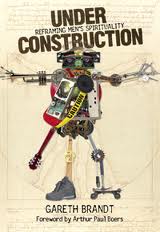 nder Construction: Reframing Men’s Spirituality Gareth Brandt (Herald Press) $13.99 Let it to the Mennonite’s to offer a profound, wonderful book that deconstructs the macho, pseudo-military, kick-butt, worldly vibe of many current evangelical men’s books. I have reviewed this before, and it celebrated it as a mature, wise, careful, nuanced, and good study of men’s ministry, pondering a truly Christ-like vision of masculinity. There is a foreword by the wonderful spiritual director and pastor Arthur Paul Boers. There are candid stories, it is disarming (in more ways than one.) I appreciate his rejection of the warrior imagery as a main metaphor for Christian men. He is a dreamer. He is a real man. He is a solid Christian. He’s given us, here, one of the more important studies in the field. Really, really nice.
nder Construction: Reframing Men’s Spirituality Gareth Brandt (Herald Press) $13.99 Let it to the Mennonite’s to offer a profound, wonderful book that deconstructs the macho, pseudo-military, kick-butt, worldly vibe of many current evangelical men’s books. I have reviewed this before, and it celebrated it as a mature, wise, careful, nuanced, and good study of men’s ministry, pondering a truly Christ-like vision of masculinity. There is a foreword by the wonderful spiritual director and pastor Arthur Paul Boers. There are candid stories, it is disarming (in more ways than one.) I appreciate his rejection of the warrior imagery as a main metaphor for Christian men. He is a dreamer. He is a real man. He is a solid Christian. He’s given us, here, one of the more important studies in the field. Really, really nice.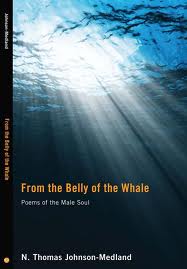 rom the Belly of the Whale: Poems of the Male Soul N. Thomas Johnson-Medland (Resource Publications) $17.00 Tom is an ordained United Methodist clergyman, has been a camp director, a garden-to-table chef, and now is CEO of a prominent hospice ministry. He is also a great writer and poet. There are some good poems here about hiking, including a whole section called “Yosemite at Fifty: The John Muir Poems” which are very nice.
rom the Belly of the Whale: Poems of the Male Soul N. Thomas Johnson-Medland (Resource Publications) $17.00 Tom is an ordained United Methodist clergyman, has been a camp director, a garden-to-table chef, and now is CEO of a prominent hospice ministry. He is also a great writer and poet. There are some good poems here about hiking, including a whole section called “Yosemite at Fifty: The John Muir Poems” which are very nice. 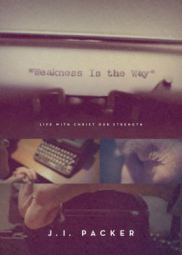 eakness is the Way: Life With Christ Our Strength J. I. Packer (Crossway) $14.99 This is a small, compact hardback, sans dust-jacket, making it a cool-looking little gift. It is also a truly stunning work, a powerful remind of gospel-centered truth. Christ is our strength. We can embrace our frailties — whether one is wracked with pain, wracked with anxiety, or facing the common ailments of aging. Most of us try desperately to be sufficient on our own, and we resent our limitations and our needs. Packer (who you should know is a very popular, thoughtful, Reformed theologian and gracious Bible teacher) was hit by a truck as a young man and is of course himself facing now his own older years and he is candid about that. Drawn from 2 Corinthians. Watch this brief, but very moving,YouTube video of Packer talking about the book,
eakness is the Way: Life With Christ Our Strength J. I. Packer (Crossway) $14.99 This is a small, compact hardback, sans dust-jacket, making it a cool-looking little gift. It is also a truly stunning work, a powerful remind of gospel-centered truth. Christ is our strength. We can embrace our frailties — whether one is wracked with pain, wracked with anxiety, or facing the common ailments of aging. Most of us try desperately to be sufficient on our own, and we resent our limitations and our needs. Packer (who you should know is a very popular, thoughtful, Reformed theologian and gracious Bible teacher) was hit by a truck as a young man and is of course himself facing now his own older years and he is candid about that. Drawn from 2 Corinthians. Watch this brief, but very moving,YouTube video of Packer talking about the book,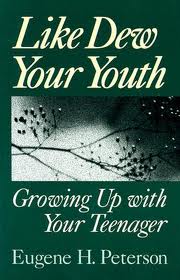 ike Dew Your Youth: Growing Up with Your Teenager Eugene Peterson (Eerdmans) $16.00 Holy moly, did you know that Peterson had a parenting book? Written early in the career of the careful, slow, mature theologian and spiritual author, it is nonetheless nearly timeless. Granted, there isn’t anything in it about facebook or social networking with kids, but his wisdom is enduring and profound, his writing eloquent. He claims that adolescence is a gift from God to the parent of middle-age.” This is not your most typical book of can-do parenting advice but it is sage and solid.
ike Dew Your Youth: Growing Up with Your Teenager Eugene Peterson (Eerdmans) $16.00 Holy moly, did you know that Peterson had a parenting book? Written early in the career of the careful, slow, mature theologian and spiritual author, it is nonetheless nearly timeless. Granted, there isn’t anything in it about facebook or social networking with kids, but his wisdom is enduring and profound, his writing eloquent. He claims that adolescence is a gift from God to the parent of middle-age.” This is not your most typical book of can-do parenting advice but it is sage and solid.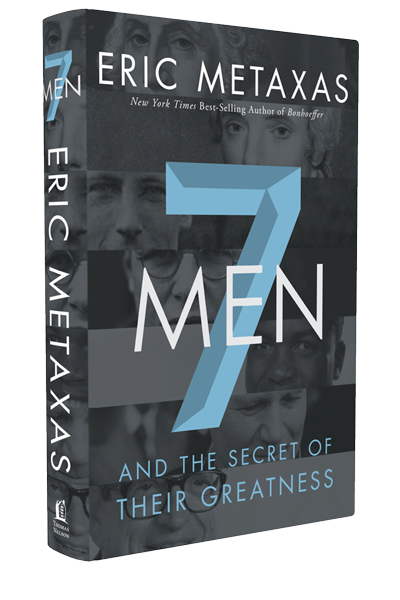 Men and the Secret of Their Greatness
Men and the Secret of Their Greatness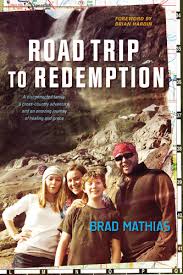 oad Trip to Redemption Brad Mathias (Tyndale Momentum) $14.99 This book is amazing, pretty well written, passionate, raw. The author admits to being so seriously involved in his work that he terribly fouled up his marriage. Further, he had an affair, and ended up living separated, in another state from his wife and children. God spoke to him in a pretty dramatic way and, long story short, he profoundly repents, returns to regain his wife’s trust, and through a miracle of God’s grace, is reunited. But that is merely the backstory, told in the opening chapters. Later, Mathias finds that he is growing distant from his teen kids — one maybe never forgave him from his earlier failings — so he and his wife and kids do a long road trip across the country.
oad Trip to Redemption Brad Mathias (Tyndale Momentum) $14.99 This book is amazing, pretty well written, passionate, raw. The author admits to being so seriously involved in his work that he terribly fouled up his marriage. Further, he had an affair, and ended up living separated, in another state from his wife and children. God spoke to him in a pretty dramatic way and, long story short, he profoundly repents, returns to regain his wife’s trust, and through a miracle of God’s grace, is reunited. But that is merely the backstory, told in the opening chapters. Later, Mathias finds that he is growing distant from his teen kids — one maybe never forgave him from his earlier failings — so he and his wife and kids do a long road trip across the country. 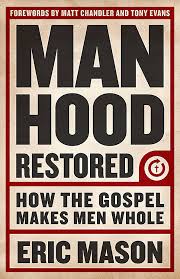 anhood Restored: How the Gospel Makes Men Whole
anhood Restored: How the Gospel Makes Men Whole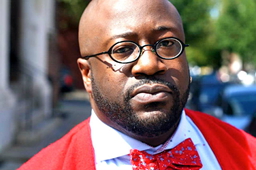 of Greek or Hebrew words, referencing study tools of the
of Greek or Hebrew words, referencing study tools of the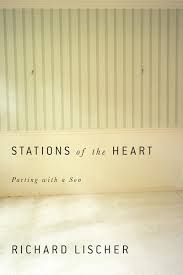 tations of the Heart: Parting with a Son
tations of the Heart: Parting with a Son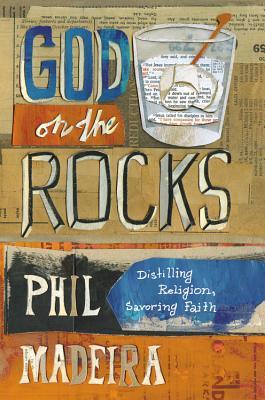 od on the Rocks: Distilling Religion, Savoring Faith
od on the Rocks: Distilling Religion, Savoring Faith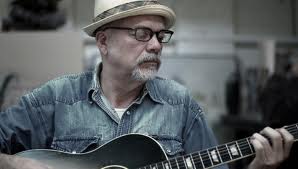 e, then this deftly penned collection of
e, then this deftly penned collection of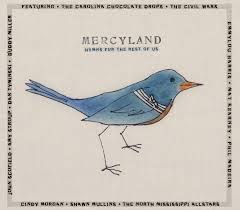 of Us that Maidera pulled together — it has songs from The Civil Wars, The North Mississippi All-Stars, the Carolina Chocolate Drops to Emmy Lou to Matt Kearney to Buddy and Julie Miller. It is firmly grounded in the Americana roots sound and replete with Southern faith
of Us that Maidera pulled together — it has songs from The Civil Wars, The North Mississippi All-Stars, the Carolina Chocolate Drops to Emmy Lou to Matt Kearney to Buddy and Julie Miller. It is firmly grounded in the Americana roots sound and replete with Southern faith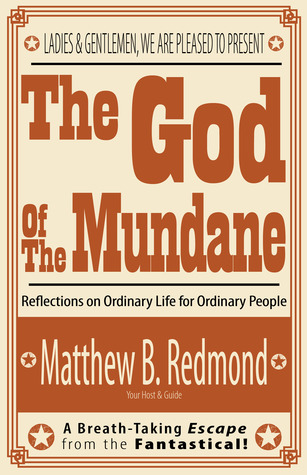 he God of the Mundane: Reflections on Ordinary Life for
he God of the Mundane: Reflections on Ordinary Life for appy, Happy, Happy: My Life and Legacy as the Duck Commander
appy, Happy, Happy: My Life and Legacy as the Duck Commander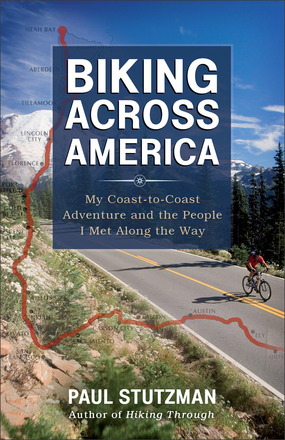 iking Across America My Coast-to-Coast Adventure and the People I Met Along the Way Paul Stutzman (Revell) $12.99 The first book this guy wrote was a big seller, and very well loved. People would come back and buy extras to give away.
iking Across America My Coast-to-Coast Adventure and the People I Met Along the Way Paul Stutzman (Revell) $12.99 The first book this guy wrote was a big seller, and very well loved. People would come back and buy extras to give away.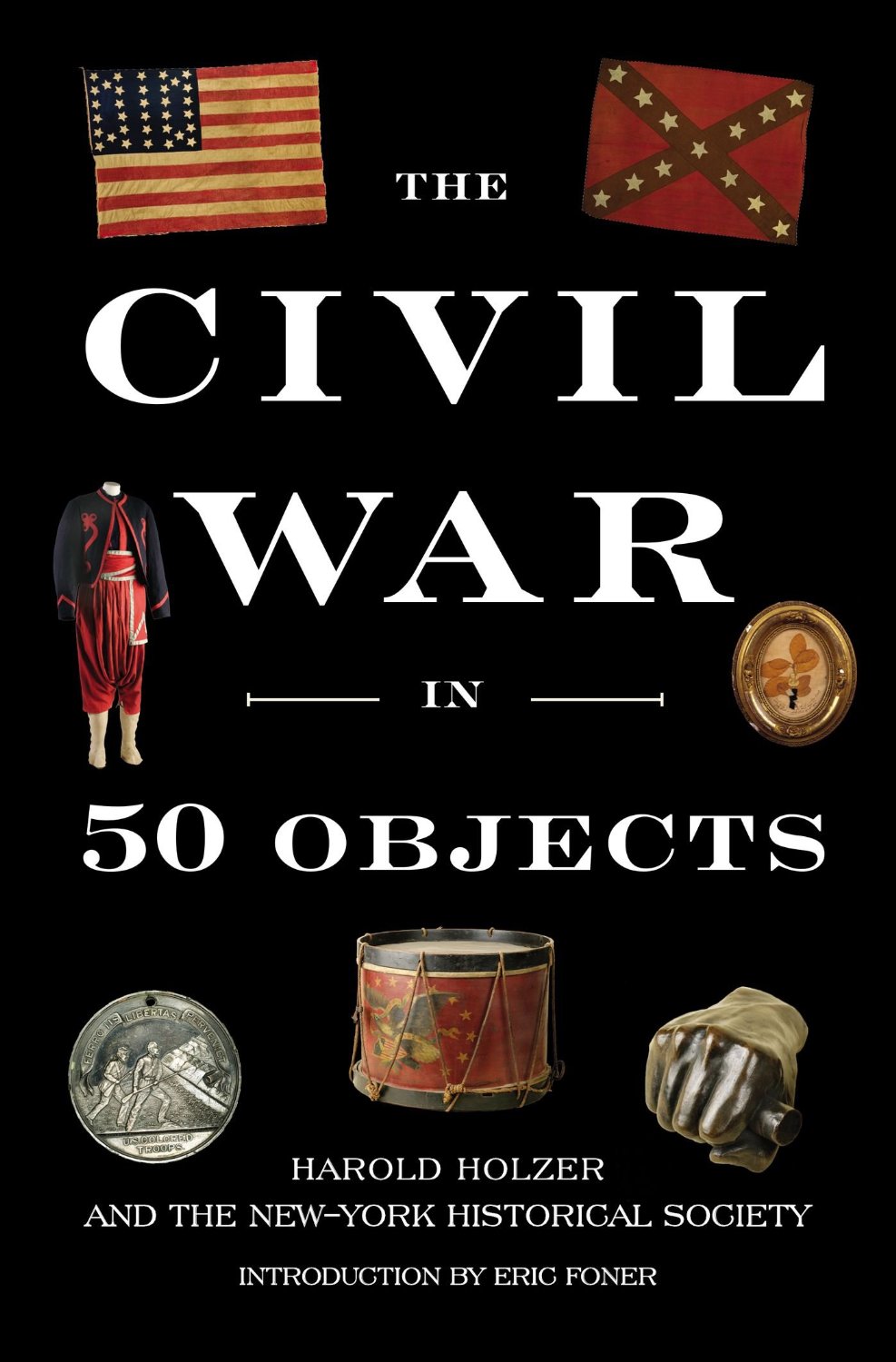 he Civil War in 50 Objects Harold Halzer (Viking) $36.00
he Civil War in 50 Objects Harold Halzer (Viking) $36.00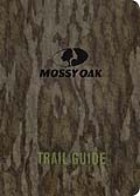 ossy Oak Trail Guide: Featuring Devotions from The Message: Solo (NavPress) $19.99 This is a camo covered, slim devotional is ideal for hunters or outdoorsman. It includes some true stories of hunting and wilderness survival, has some outdoor survival conditions info, practical pointers even for tracking and dressing game. Best, the devotions are better than most in this genre —The Message Solo was devised with a “read/think/pray” process by Eugene Peterson — and has been for us a beset-selling devo (in a larger paperback edition) for years. This fuzzy-covered trail edition is pretty cool for guys that hunt or camp. Comes with a bright orange wrap-around paper sleeve — hunter orange, get it? Yeah.
ossy Oak Trail Guide: Featuring Devotions from The Message: Solo (NavPress) $19.99 This is a camo covered, slim devotional is ideal for hunters or outdoorsman. It includes some true stories of hunting and wilderness survival, has some outdoor survival conditions info, practical pointers even for tracking and dressing game. Best, the devotions are better than most in this genre —The Message Solo was devised with a “read/think/pray” process by Eugene Peterson — and has been for us a beset-selling devo (in a larger paperback edition) for years. This fuzzy-covered trail edition is pretty cool for guys that hunt or camp. Comes with a bright orange wrap-around paper sleeve — hunter orange, get it? Yeah. World: Faith, Culture and Computer Technology (IVP Academic; $18.00) by Derek Schuurman, a work that beautifully illustrates how an author can think distinctively as a Christian in both appreciating and critiquing the values, ethos, and practices embedded in a particular side of life or academic discipline. Such discernment can give us a truly insightful, faithful and fruitful way of bringing our faith to bear on the topic, and how we do or don’t relate to that particular sphere of life. In this case, the topic at hand is technology, and, particularly, computer science; I said that Schuurman’s new release is the best Christian book on the subject.
World: Faith, Culture and Computer Technology (IVP Academic; $18.00) by Derek Schuurman, a work that beautifully illustrates how an author can think distinctively as a Christian in both appreciating and critiquing the values, ethos, and practices embedded in a particular side of life or academic discipline. Such discernment can give us a truly insightful, faithful and fruitful way of bringing our faith to bear on the topic, and how we do or don’t relate to that particular sphere of life. In this case, the topic at hand is technology, and, particularly, computer science; I said that Schuurman’s new release is the best Christian book on the subject.  Wonder: Common Grace in Science and Art (Christian’s Library Press; $14.99) and we’ve offered it at 20% off that regular price at earlier BookNotes columns. It isn’t light reading although these were columns that had been published in the daily newspaper in those years.
Wonder: Common Grace in Science and Art (Christian’s Library Press; $14.99) and we’ve offered it at 20% off that regular price at earlier BookNotes columns. It isn’t light reading although these were columns that had been published in the daily newspaper in those years. are making big, big choices — about identity, calling, vocation, truth, values, relationships and more — we often reduce faith to a less than robust, full-orbed worldview, It’s no wonder a lot of young adults don’t find it worth maintaining any serious connection to the church or faith of their youth. It will come as no surprise to you that we suggest Make College Count: A Faithful Guide for Life and Learning by our friend Derek Melleby (Baker; $12.99) as a key resource
are making big, big choices — about identity, calling, vocation, truth, values, relationships and more — we often reduce faith to a less than robust, full-orbed worldview, It’s no wonder a lot of young adults don’t find it worth maintaining any serious connection to the church or faith of their youth. It will come as no surprise to you that we suggest Make College Count: A Faithful Guide for Life and Learning by our friend Derek Melleby (Baker; $12.99) as a key resource for those younger students heading off to college for the first time. Derek co-authored with Geneva College sociologist Donald Opitz a tremendously upbeat and fun and relevant study for older students, The Outrageous Idea of Academic Faithfulness: A Guide for Students (Brazos; $13.99) No other book for students gets at these things the way these do — is it any surprise they were influenced by this whole “all of life redeemed” integrated vision learned by Kuyper’s “every square inch” movement?
for those younger students heading off to college for the first time. Derek co-authored with Geneva College sociologist Donald Opitz a tremendously upbeat and fun and relevant study for older students, The Outrageous Idea of Academic Faithfulness: A Guide for Students (Brazos; $13.99) No other book for students gets at these things the way these do — is it any surprise they were influenced by this whole “all of life redeemed” integrated vision learned by Kuyper’s “every square inch” movement? it, a powerhouse of a booklet, interesting, informative, inspiring, and also quite thoughtful, designed to help students take up the call to “think Christianly” and use their minds to advance God’s mission in the world. For the size and prize, it just can’t be beat. Jao draws on many of these same sources that we regularly highlight here. If you — or your children — are involved in a campus ministry fellowship group on campus and they don’t talk about these kinds of things, and aren’t familiar with these sorts of resources, I guess I wouldn’t shout “ministry malpractice” quite yet. But do know that you may need to share this stuff with them, helping them get this perspective onto their radar screen. Could you imagine a sports ministry that doesn’t relate faith and sports, or a fellowship group among artists, say, which doesn’t talk about art, or a missionary to, oh, say, Sweden, who doesn’t care about the things the Swiss do? But college ministries abound that fail to help students think Christianly about their calling and careers and their life in the classroom at college. Dumb. That’s just dumb. I hope you give your student’s going off to college some good resources to help them navigate the journey with this kind of relevance and integrity.
it, a powerhouse of a booklet, interesting, informative, inspiring, and also quite thoughtful, designed to help students take up the call to “think Christianly” and use their minds to advance God’s mission in the world. For the size and prize, it just can’t be beat. Jao draws on many of these same sources that we regularly highlight here. If you — or your children — are involved in a campus ministry fellowship group on campus and they don’t talk about these kinds of things, and aren’t familiar with these sorts of resources, I guess I wouldn’t shout “ministry malpractice” quite yet. But do know that you may need to share this stuff with them, helping them get this perspective onto their radar screen. Could you imagine a sports ministry that doesn’t relate faith and sports, or a fellowship group among artists, say, which doesn’t talk about art, or a missionary to, oh, say, Sweden, who doesn’t care about the things the Swiss do? But college ministries abound that fail to help students think Christianly about their calling and careers and their life in the classroom at college. Dumb. That’s just dumb. I hope you give your student’s going off to college some good resources to help them navigate the journey with this kind of relevance and integrity.  For those with a dualistic view, why would a health care provider want to read a theological book about the human body? Why would a local savings and loan officer want to read a book about faith and economics? Why would a family counselor what to read a book about different models of using the Bible in therapy? Why would an engineer want to read up on a faith-based evaluation of technology? Why would anybody want to hold up their entertainment practices (as sports fan or movie goer, say) to the demands of a Christian framework? Why indeed. That pastors and Bible teachers don’t often talk about these kinds of things (and most Christian authors of popular Christian books don’t much either) means that ordinary Christian folk just don’t think to be curious about these kinds of books, which they may not even know exist! Being a lawyer or doctor or school teacher having done some intentional thinking about what that means and looks like? How novel!
For those with a dualistic view, why would a health care provider want to read a theological book about the human body? Why would a local savings and loan officer want to read a book about faith and economics? Why would a family counselor what to read a book about different models of using the Bible in therapy? Why would an engineer want to read up on a faith-based evaluation of technology? Why would anybody want to hold up their entertainment practices (as sports fan or movie goer, say) to the demands of a Christian framework? Why indeed. That pastors and Bible teachers don’t often talk about these kinds of things (and most Christian authors of popular Christian books don’t much either) means that ordinary Christian folk just don’t think to be curious about these kinds of books, which they may not even know exist! Being a lawyer or doctor or school teacher having done some intentional thinking about what that means and looks like? How novel! faith is “always personal but never private.” The dichotomy and dualism between the so-called sacred and so-called secular came from the pagan Greeks like Plato and isn’t a Biblically-faithful way of seeing life, where (as C.S. Lewis put it) “matter matters.” Authors as diverse as Brian Walsh and Richard Middleton (The Transforming Vision: Shaping a Christian Worldview [IVP; $17.99]) and Nancy Pearcey (Total Truth: Liberating Christianity from Its Cultural Captivity [Crossway; $20.99]) or Leslie Newbegin (The Gospel in a Pluralist Society [Eerdmans; $25.00]) all get at this. Dividing life into sacred and secular, and thinking of the human person as eternal souls trapped in temporal bodies, just isn’t how the Bible tells the story. We have got to stop talking like that.
faith is “always personal but never private.” The dichotomy and dualism between the so-called sacred and so-called secular came from the pagan Greeks like Plato and isn’t a Biblically-faithful way of seeing life, where (as C.S. Lewis put it) “matter matters.” Authors as diverse as Brian Walsh and Richard Middleton (The Transforming Vision: Shaping a Christian Worldview [IVP; $17.99]) and Nancy Pearcey (Total Truth: Liberating Christianity from Its Cultural Captivity [Crossway; $20.99]) or Leslie Newbegin (The Gospel in a Pluralist Society [Eerdmans; $25.00]) all get at this. Dividing life into sacred and secular, and thinking of the human person as eternal souls trapped in temporal bodies, just isn’t how the Bible tells the story. We have got to stop talking like that. om Wright has helped us all a lot with this, in most of his books, but especially in his popular, thought-provoking Surprised By Hope: Rethinking Heaven, the Resurrection, and the Mission of the Church (HarperOne; $24.99.) It wonderfully explores how our views of the afterlife are not always properly informed by Biblical and theological clarity. And there’s that Greek dualism thing. What we think about the future does effect how we live now, so this call to rethink heaven clearly relates to the mission of the church.
om Wright has helped us all a lot with this, in most of his books, but especially in his popular, thought-provoking Surprised By Hope: Rethinking Heaven, the Resurrection, and the Mission of the Church (HarperOne; $24.99.) It wonderfully explores how our views of the afterlife are not always properly informed by Biblical and theological clarity. And there’s that Greek dualism thing. What we think about the future does effect how we live now, so this call to rethink heaven clearly relates to the mission of the church.  food and eating, and on seemingly mundane matters like homemaking, gardening, neighborhood life, caring for pets, even sports and leisure. The early church long ago named the super-spiritual, world-denying nature of gnosticism as a great heresy, and an inhuman threat, and we counter it by a vision which proclaims “whether you eat or drink” (or play or work) “do all to the glory of God.” (1 Corinthians 10:31.)
food and eating, and on seemingly mundane matters like homemaking, gardening, neighborhood life, caring for pets, even sports and leisure. The early church long ago named the super-spiritual, world-denying nature of gnosticism as a great heresy, and an inhuman threat, and we counter it by a vision which proclaims “whether you eat or drink” (or play or work) “do all to the glory of God.” (1 Corinthians 10:31.) Calvinistic. One good book to get a feel for this is the important Young Restless and Reformed: A Journalist’s Journey with the New Calvinists by Collin Hansen (Crossway; $15.99.) The frustrating thing is that some casual pundits (and religious writers who ought to know better) have referred to this upswing in conservative Reformed doctrine as neo-Calvinism, which it is not. This recent religious phenomenon may be better described as a neo-Puritanism as much of the piety of young, restless newly reformed Calvinists is more Jonathan Edwards than Abraham Kuyper, more John Piper or Mark Driscoll than, oh, say, Jamie Smith or Richard Mouw. A new upswing in interest in conventional Calvinism does not equal neo-Calvinism.
Calvinistic. One good book to get a feel for this is the important Young Restless and Reformed: A Journalist’s Journey with the New Calvinists by Collin Hansen (Crossway; $15.99.) The frustrating thing is that some casual pundits (and religious writers who ought to know better) have referred to this upswing in conservative Reformed doctrine as neo-Calvinism, which it is not. This recent religious phenomenon may be better described as a neo-Puritanism as much of the piety of young, restless newly reformed Calvinists is more Jonathan Edwards than Abraham Kuyper, more John Piper or Mark Driscoll than, oh, say, Jamie Smith or Richard Mouw. A new upswing in interest in conventional Calvinism does not equal neo-Calvinism. atonement theory, say, and the claim that Christ is sufficient for everything, is, again, not the same thing as what has long been called neo-Calvinism. This is a large distinction, and one that sloppy commentators have muddled, starting with the wildly popular “10 Ideas Changing the World Right Now” cover story in Time magazine a few years ago. (I saw that article cited somewhere just this week!) The phrase neo-Calvinism has a long, storied, linage (as that Jim Bratt biography just begins to tell) and the fairly recent “Gospel Coalition” and the hip, young, conservative “newly” Reformed movement may or may not find themselves in alignment with the trajectory of full-orbed, democratic, Dutch Kuyperianism. In other words, some who have recently embraced strict Reformed doctrine may not want to live into a reformational vision of the sort I’ve described here.
atonement theory, say, and the claim that Christ is sufficient for everything, is, again, not the same thing as what has long been called neo-Calvinism. This is a large distinction, and one that sloppy commentators have muddled, starting with the wildly popular “10 Ideas Changing the World Right Now” cover story in Time magazine a few years ago. (I saw that article cited somewhere just this week!) The phrase neo-Calvinism has a long, storied, linage (as that Jim Bratt biography just begins to tell) and the fairly recent “Gospel Coalition” and the hip, young, conservative “newly” Reformed movement may or may not find themselves in alignment with the trajectory of full-orbed, democratic, Dutch Kuyperianism. In other words, some who have recently embraced strict Reformed doctrine may not want to live into a reformational vision of the sort I’ve described here.
 The Explicit Gospel by Matt Chandler with Jared Wilson (Crossway; $17.99) I am not sure this book emerged from this battle of terms, and the important nuances that distinguish these two camps but it is concerned about these two ways of living into a Biblically Reformed theological vision these days. I think it is very helpful. Chandler, who has not had affiliations with the reformational movement but is aligned more with the neo-Puritans, shows the strengths and weakness of those who have a gospel-centered vision that emphasizes the assurance of salvation, understanding the atonement, makes clear about how justification works, that helps us resist personal idols and the simple truths of grace “on the ground.” This group is quick to talk about “treasuring” the gospel (ht to John Piper) and (in contrast) those who fixate on the cultural mandate, Kingdom thinking, social renewal, and the big picture of the restoration of all creation, including the social architecture and institutions of the society. One tends to have an approach that forms people through the lens of systematic theology while the other tends to shape people by the unfolding story of Scripture — creation/fall/redemption/restoration and the like. In some ways, this is naming the approaches of the newly Calvinistas and the Kuyperian neo-Calvinists.
The Explicit Gospel by Matt Chandler with Jared Wilson (Crossway; $17.99) I am not sure this book emerged from this battle of terms, and the important nuances that distinguish these two camps but it is concerned about these two ways of living into a Biblically Reformed theological vision these days. I think it is very helpful. Chandler, who has not had affiliations with the reformational movement but is aligned more with the neo-Puritans, shows the strengths and weakness of those who have a gospel-centered vision that emphasizes the assurance of salvation, understanding the atonement, makes clear about how justification works, that helps us resist personal idols and the simple truths of grace “on the ground.” This group is quick to talk about “treasuring” the gospel (ht to John Piper) and (in contrast) those who fixate on the cultural mandate, Kingdom thinking, social renewal, and the big picture of the restoration of all creation, including the social architecture and institutions of the society. One tends to have an approach that forms people through the lens of systematic theology while the other tends to shape people by the unfolding story of Scripture — creation/fall/redemption/restoration and the like. In some ways, this is naming the approaches of the newly Calvinistas and the Kuyperian neo-Calvinists. News and Good Works: A Theology of the Whole Gospel [Baker; $20.00.] Evangelical Anabaptist that he is, he gets it so, so right, with a passionate care for peace, social reform and public justice and a very sincere heart for Christ-centered evangelism and traditional proclamation of the gospel. With insights from Kuyperians, though, Ron insists that the both/and wholistic view of salvation that he proposes — words and deeds — points to a whole “creation regained” vision, which goes under the Biblical rubric of The Kingdom of God. Right on, Ron, right on!)
News and Good Works: A Theology of the Whole Gospel [Baker; $20.00.] Evangelical Anabaptist that he is, he gets it so, so right, with a passionate care for peace, social reform and public justice and a very sincere heart for Christ-centered evangelism and traditional proclamation of the gospel. With insights from Kuyperians, though, Ron insists that the both/and wholistic view of salvation that he proposes — words and deeds — points to a whole “creation regained” vision, which goes under the Biblical rubric of The Kingdom of God. Right on, Ron, right on!)  (for the common good) in a pluralistic society and yet asserts the need for a distinctively Christian mindset and approach to all areas of life, including the spheres of business, education, science, the arts, and politics. Kuyper outlined this robust, multi-faceted, culturally-influential, wide-as-life vision of transforming culture in his 1898 Stone Lectures at Princeton, still in print as Lectures on Calvinism (Eerdmans; $16.00).
(for the common good) in a pluralistic society and yet asserts the need for a distinctively Christian mindset and approach to all areas of life, including the spheres of business, education, science, the arts, and politics. Kuyper outlined this robust, multi-faceted, culturally-influential, wide-as-life vision of transforming culture in his 1898 Stone Lectures at Princeton, still in print as Lectures on Calvinism (Eerdmans; $16.00). 
 neo-Calvinists at Toronto’s ICS is James K.A. Smith, whose recent books are, by all accounts, must- reads. Few books have been as discussed and embraced in recent years as Desiring the Kingdom: Worship, Worldview, and Cultural Formation and Imagining the Kingdom: How Worship Works. Jamie is a friend, and so we are eager to promote his stuff, but, truly, these are among our favorite recent books and although they are serious and provocative, you really, really should know them. Both of these in his “cultural liturgies” series are published by Baker Academic and sell for $22.00 (although we have promoted them often at BookNotes and still offer them for 20% off!)
neo-Calvinists at Toronto’s ICS is James K.A. Smith, whose recent books are, by all accounts, must- reads. Few books have been as discussed and embraced in recent years as Desiring the Kingdom: Worship, Worldview, and Cultural Formation and Imagining the Kingdom: How Worship Works. Jamie is a friend, and so we are eager to promote his stuff, but, truly, these are among our favorite recent books and although they are serious and provocative, you really, really should know them. Both of these in his “cultural liturgies” series are published by Baker Academic and sell for $22.00 (although we have promoted them often at BookNotes and still offer them for 20% off!) lovely and very kind Letters to a Young Calvinist: An Invitation to the Reformed Tradition (Baker; $14.99.) I was not kidding when I said – and I said it often, when this little book came out a few years ago — that Letters to... is very helpful, even if you are neither young nor Calvinist.
lovely and very kind Letters to a Young Calvinist: An Invitation to the Reformed Tradition (Baker; $14.99.) I was not kidding when I said – and I said it often, when this little book came out a few years ago — that Letters to... is very helpful, even if you are neither young nor Calvinist. Tullian Tchividjan’s Unfashionable: Making a Difference in the World by Being Different (Multnomah; $14.99) – must be shaped by faith and have something transcendent to offer. What good is it to bend over backwards to engage the world, only to have nothing unique to share once we “build the bridge” and relate relevantly to the culture around us? So this is a call to more than balance, but to a robust sort of “in but not of” holy relevance, a relevant sort of holiness. Richard Mouw shaped me years ago in a wonderful, now out of print book, then published by Augsburg Fortress, entitled “Called to Holy Worldliness.” That’s it!
Tullian Tchividjan’s Unfashionable: Making a Difference in the World by Being Different (Multnomah; $14.99) – must be shaped by faith and have something transcendent to offer. What good is it to bend over backwards to engage the world, only to have nothing unique to share once we “build the bridge” and relate relevantly to the culture around us? So this is a call to more than balance, but to a robust sort of “in but not of” holy relevance, a relevant sort of holiness. Richard Mouw shaped me years ago in a wonderful, now out of print book, then published by Augsburg Fortress, entitled “Called to Holy Worldliness.” That’s it!  that implies we dare not engage this real world without being terminally stained, or wacky liberal stuff from Westminster/John Knox, Fortress, or HarperOne, that denies core Christian teaching. I think that the recent award winning book — even commended by The Christian Century — Bad Religion: How We Became a Nation of Heretics by Russ Douthat (Free Press; $16.00 ) is important here. In many ways, North American religion has adopted too unknowingly the ways of the surrounding culture, and it has effected us profoundly.
that implies we dare not engage this real world without being terminally stained, or wacky liberal stuff from Westminster/John Knox, Fortress, or HarperOne, that denies core Christian teaching. I think that the recent award winning book — even commended by The Christian Century — Bad Religion: How We Became a Nation of Heretics by Russ Douthat (Free Press; $16.00 ) is important here. In many ways, North American religion has adopted too unknowingly the ways of the surrounding culture, and it has effected us profoundly. The best book on this latter part of the problem — the selling out of contemporary evangelicals — is seen in an amazing, powerful collection of pieces inspired by the work of David C. Wells, called Renewing the Evangelical Mission, edited by Richard Lints (Eerdmans; $34.00.) It has important pieces packed full of sociological criticism, theological pondering, church-related discernment, all wondering, in the legacy of the major work on this done by Wells, how to call those who claim to care most about the heart of the gospel, back to the heart of the gospel. If read many of these essays, from Os Guinness, Miroslov Volf, J. I. Packer, Michael Horton, Kevin Vanhoozer, Cornelius Plantinga and more. ??It was bad enough when evangelicals could be categorized as disengaged but purist, culturally irrelevant, but clear about first things. Alas, it seems they are increasingly like their older nemesis, mainline Protestants who were known for being high on relevance but not so good on orthodox holiness. Many Catholics, Lutherans and Anglicans now seem best situated to stand for historic truths in relevant ways. Anyway, Renewing the Evangelical Mission is an important volume for many of us, a good followup to Wells’ many heart-felt, scholarly assessments of the state of faithfulness in our time.)
The best book on this latter part of the problem — the selling out of contemporary evangelicals — is seen in an amazing, powerful collection of pieces inspired by the work of David C. Wells, called Renewing the Evangelical Mission, edited by Richard Lints (Eerdmans; $34.00.) It has important pieces packed full of sociological criticism, theological pondering, church-related discernment, all wondering, in the legacy of the major work on this done by Wells, how to call those who claim to care most about the heart of the gospel, back to the heart of the gospel. If read many of these essays, from Os Guinness, Miroslov Volf, J. I. Packer, Michael Horton, Kevin Vanhoozer, Cornelius Plantinga and more. ??It was bad enough when evangelicals could be categorized as disengaged but purist, culturally irrelevant, but clear about first things. Alas, it seems they are increasingly like their older nemesis, mainline Protestants who were known for being high on relevance but not so good on orthodox holiness. Many Catholics, Lutherans and Anglicans now seem best situated to stand for historic truths in relevant ways. Anyway, Renewing the Evangelical Mission is an important volume for many of us, a good followup to Wells’ many heart-felt, scholarly assessments of the state of faithfulness in our time.) book of Barbara Brown Taylor, her autobiographical The Preaching Life (Cowley; $17.95.) I read these passages out loud sometimes, and folks are always moved. She has a wonderful story of a pastor who mentioned her love for tadpoles in his sermon — and helped her see “God’s glossolalia” in the intricacies of nature, and God’s Spirit at work in her own desire to learn, and to care for creation; this literally help move her to faith, realizing she was in this God-drenched world, and it is a beautiful part of her story. The second section is about the vocation of lay people, and how their callings, like hers as an Episcopal priest, are sacramental in nature. She lists off a handful of jobs and in a phrase notes how they might fulfill some profound human role. It’s beautiful stuff. I only wish more churches believed this, or talked about it some.
book of Barbara Brown Taylor, her autobiographical The Preaching Life (Cowley; $17.95.) I read these passages out loud sometimes, and folks are always moved. She has a wonderful story of a pastor who mentioned her love for tadpoles in his sermon — and helped her see “God’s glossolalia” in the intricacies of nature, and God’s Spirit at work in her own desire to learn, and to care for creation; this literally help move her to faith, realizing she was in this God-drenched world, and it is a beautiful part of her story. The second section is about the vocation of lay people, and how their callings, like hers as an Episcopal priest, are sacramental in nature. She lists off a handful of jobs and in a phrase notes how they might fulfill some profound human role. It’s beautiful stuff. I only wish more churches believed this, or talked about it some.  that have stood in the Kuyperian branch of neo-Calvinism have been of extraordinary importance. The unique philosophical insights of, say, Herman Dooyeweerd, or those who took up his call to do wholistic philosophical work in the spirit of Christ, informed by a healthy view of the story of Scripture, have been truly useful for various spheres of scholarship.
that have stood in the Kuyperian branch of neo-Calvinism have been of extraordinary importance. The unique philosophical insights of, say, Herman Dooyeweerd, or those who took up his call to do wholistic philosophical work in the spirit of Christ, informed by a healthy view of the story of Scripture, have been truly useful for various spheres of scholarship. send to you, for free, an important book written by Abraham Kuyper, a book that is considered by some a true classic, The Problem With Poverty edited by James Skillen (Baker.) All you have to do is type in that you want it, and be willing to pay $5 shipping.
send to you, for free, an important book written by Abraham Kuyper, a book that is considered by some a true classic, The Problem With Poverty edited by James Skillen (Baker.) All you have to do is type in that you want it, and be willing to pay $5 shipping.